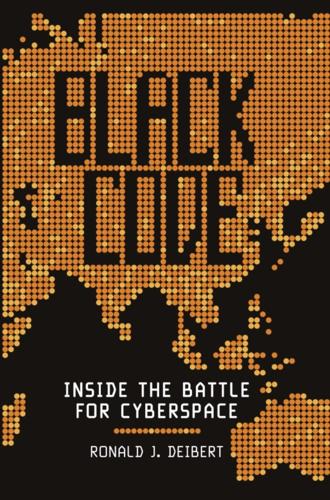
Black Code: Inside the Battle for Cyberspace
by
Ronald J. Deibert
Published 13 May 2013
Is its support for human rights online selectively applied to those areas that mesh with the company’s private interests? (A full disclosure is in order: like many other Internet research groups, the Citizen Lab has benefited from Google donations and, particularly, it is a host organization in the annual Google Policy Fellow Program, which funds a visiting researcher placed at the Citizen Lab each summer. This support is fully transparent and comes with no strings attached. Should that change, the Citizen Lab would not accept financial support from Google.) We have come to depend on social media like Twitter and Facebook as the online equivalent of the public square, and we use these platforms not just for entertainment but also for political discourse.
…
Watson, “Ignoring the Great Firewall of China,” Journal of Law and Policy for the Information Society 3, no. 2 (2007). Psiphon was invented in the Citizen Lab, and released in December 2006 at an event called Protect the Net. The project was funded by the Open Society Institute as part of the Citizen Lab’s CiviSec Project. Psiphon was spun out of the University of Toronto as an independent Canadian company. Read more about Psiphon at http://psiphon.ca. Karl Kathuria, in Casting a Wider Net (a study undertaken in 2011 while a Citizen Lab/Canada Centre visiting fellow), combined ONI, Psiphon, and BBC media data to develop policies for global broadcasters whose content is filtered in censored jurisdictions: http://munkschool.utoronto.ca/downloads/casting.pdf. 5 Code words, metaphors, neologisms: Xiao Qiang, editor of the China Digital Times, has been compiling a glossary of terms used by creative Chinese netizens to bypass China’s online censors in “Grass-Mud Horse Lexicon,” China Digital Times, http://chinadigitaltimes.net/space/Introduction_to_the_Grass-Mud_Horse_Lexicon. 6 Often ignored is the connection between China’s domestic controls and the international dimensions of its cyberspace strategy: Masashi Crete-Nishihata and I examine the international and global mechanisms that facilitate the growth and spread of cyberspace controls in “Global Governance and the Spread of Cyberspace Controls,” Global Governance: A Review of Multilateralism and International Organizations 18, no. 3 (2012): 339–361. 7 Evidence of GhostNet-like compromises now surface almost weekly: Jameson Berkow reported on the Nortel breach in “Nortel Hacked to Pieces,” Financial Post, February 25, 2012, http://business.financialpost.com/2012/02/25/nortel-hacked-to-pieces. 8 It’s unlikely that China would benefit in an armed conflict: On China’s military strategy, see Timothy L.
…
, and the Lessons for Corporate Social Responsibility, Version 1.0, December 20, 2007, http://rconversation.blogs.com/YahooShiTaoLessons.pdf. 6 numerous demands by governments to eavesdrop on users: Christopher Parsons investigates BlackBerry security, and government requests for its decryption keys, in “Decrypting Blackberry Security, Decentralizing the Future,” Technology, Thoughts, and Trinkets, November 29, 2010, http://www.christopher-parsons.com/blog/technology/decrypting-blackberry-security-decentralizing-the-future. The Citizen Lab’s announcement of the RIM Check project is at “Information Warfare Monitor (Citizen Lab and SecDev Group) Announces RIM Monitoring Project,” Information Warfare Monitor, October 21, 2010, http://www.infowar-monitor.net/2010/10/information-warfare-monitor-citizen-lab-and-secdev-group-announces-rim-monitoring-project/. 7 A June 2012 Human Rights Watch (HRW) report: See in “In the Name of Security, Counterterrorism Laws Worldwide Since September 11,” Human Rights Watch, 2012, http://www.hrw.org/sites/default/files/reports/global0612ForUpload_1.pdf. 8 ATIS hosts a number of committees and subcomittees: Ryan Gallagher discusses how networks of telecom companies and international government agencies, such as the Alliance for Telecommunications Industry Solutions (ATIS), are responsible for the harmonization of surveillance laws in “How Governments and Telecom Companies Work Together on Surveillance Laws,” Slate, August 14, 2012, http://www.slate.com/articles/technology/future_tense/2012/08/how_governments_and_telecom_companies_work_together_on_surveillance_laws_.html. 9 dozens of governments party to this agreement: More information on the Council of Europe’s Convention on Cybercrime is available in Amalie M.
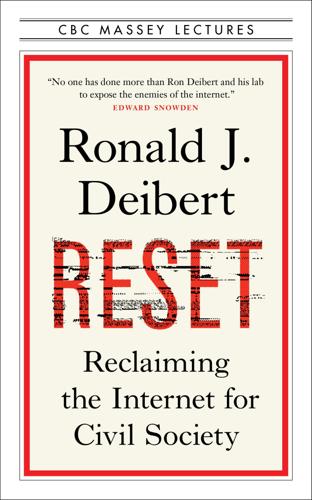
Reset
by
Ronald J. Deibert
Published 14 Aug 2020
The producer of the series was Philip Coulter; the executive producer was Greg Kelly. ronald j. deibert Ronald J. Deibert is professor of Political Science and director of the Citizen Lab at the Munk School of Global Affairs and Public Policy, University of Toronto. The Citizen Lab undertakes interdisciplinary research at the intersection of global security, information and communications technologies, and human rights. The research outputs of the Citizen Lab are routinely covered in global media, including more than two dozen reports that received exclusive front-page coverage in the New York Times, the Washington Post, and other global media over the past decade.
…
Although we didn’t know it at the time, a report the Citizen Lab published in 2016 that uncovered a UAE-run targeted espionage operation against the U.K.-based journalist Rori Donaghy, to which we gave the name Stealth Falcon, was actually detailing the work of DarkMatter.213 A former NSA contractor who was employed by DarkMatter and later became a whistleblower revealed that the intelligence start-up had even tried to hack the Citizen Lab in response to our investigations. To this day we do not know if they were successful or not. This type of targeting is no surprise. The Citizen Lab’s research into mass surveillance, censorship, and targeted digital espionage has pulled back the curtain on the quiet proliferation of the tools of digital repression.
…
While marvelling at this capacity (and putting aside legal, ethical, and other reservations), I wondered why a variation of it, based on open-sourced public research, couldn’t be developed and used to turn the tables on governments themselves: to “watch the watchers” and reveal the exercise of power going on beneath the surface of our communications environment. A mission was thus established for the Citizen Lab, and our interdisciplinary research came into focus: to serve as “counter-intelligence for global civil society.” There’s an old saying that comes to mind, though: careful what you wish for. When we first began our work at the Citizen Lab, we had no basis upon which to claim we were undertaking “counter-intelligence” for anyone, let alone global civil society. But gradually the methods, tools, and techniques became more refined; talented personnel were drawn to the mission and the freedom to explore challenging puzzles, the solutions for which had real-world consequences.
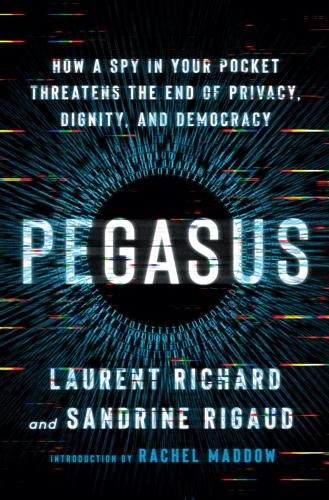
Pegasus: How a Spy in Your Pocket Threatens the End of Privacy, Dignity, and Democracy
by
Laurent Richard
and
Sandrine Rigaud
Published 17 Jan 2023
The gold standard of independent cybersecurity research facilities was Citizen Lab. The institution and its personnel were known in the field and respected around the world. So everybody on the project was pleased when Citizen Lab and its lead computer scientist, Bill Marczak, signed on to conduct the peer review. The head of Amnesty Tech, Danna Ingleton, set up the mechanics with Ron Deibert, the director of Citizen Lab in Toronto. The first stage of the two-part review was forensic analyses on a few of the iPhones in which Claudio and Donncha had found evidence of compromise by Pegasus. The review would be done blind, using Citizen Lab’s own forensic tools, without any knowledge of the methodology the Security Lab had used in its analysis.
…
The chances of discovering the provenance of these servers and the domain names they held would have been slim, but for some earlier forensic investigations run by the University of Toronto’s Citizen Lab. Researchers at Citizen Lab had been dogging one particular cybersurveillance provider for a few years. In 2016, they not only found evidence that its spyware had successfully infected the cell phone of a human rights defender in the United Arab Emirates; they had been able to piece together the company’s entire network infrastructure. Among other things, they had discovered hundreds of domain names linked to the company’s servers. Citizen Lab published many of them for everybody to see. The company had reacted in a trice, rebuilding the entire system that made up its “anonymizing transmission network” and changing the domain names.
…
He understood the necessity for peer review, but it was like his abilities were being called into question before he had had a chance to say a word. He also understood that Citizen Lab, while unspoken, was at the center of this peer review discussion. Citizen Lab was probably the best-known and best-regarded cybersurveillance weapons tracker in the world at that point, particularly concerning NSO and its Pegasus system. But Laurent and I, as well as the entire team at Amnesty International’s Security Lab, were a bit reluctant to involve researchers from Citizen Lab in the project this early, when secrecy was crucial. We managed to table the discussion of peer review for later and move on to Claudio’s formal talk.
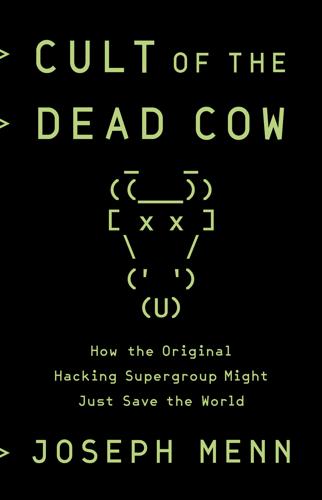
Cult of the Dead Cow: How the Original Hacking Supergroup Might Just Save the World
by
Joseph Menn
Published 3 Jun 2019
But activists suspected repressive regimes, including those under widespread sanctions, like Sudan, were using FinFisher against law-abiding dissidents. In 2012, Bloomberg News obtained suspected infected emails sent to Bahraini activists and handed them off to the Laird-inspired Citizen Lab. A Citizen Lab team led by a Google security expert dove deep. For the first time, they established that the infections were connected to Gamma, how the infections worked, and that data from the victims would be sent to the Bahraini government’s telecommunications company. Citizen Lab found FinFisher servers in dozens of countries, including the UAE, Ethiopia, and Vietnam, where bloggers were being targeted. Technological tricks used by the company included intervening in software update processes and using exploits for Adobe’s Flash video software.
…
The victims included an email server for the Associated Press in Hong Kong, an unclassified computer at NATO headquarters, and embassies belonging to India, Pakistan, Germany, and Thailand. Deibert’s team dubbed the spy network GhostNet. Citizen Lab disclosed it in 2009, making front pages around the world. Deibert had brought the New York Times in early, in part for maximum impact and in part as a hedge in case the Canadian government tried to suppress what the Citizen Lab had found. The first such account by a nongovernment agency and one of the first of any kind linking specific computer espionage to a world power, the GhostNet paper did not explicitly blame China.
…
Rather than try to sort out who was working for whom and whether it would be appropriate to favor one country’s emissaries over another’s, Freitas threw up his hands. He decided to share samples only with the Citizen Lab, which had done the hard ethical reasoning. But in a community as heavily targeted as the Tibetans, with various Westerners helping out, some information inevitably went to the powerful Western agencies who were fighting the Chinese in many places. Hacktivism gave those operatives an excuse to be in and among the activists. For all of Deibert’s careful ethical balancing, intelligence figures still involved themselves in the Citizen Lab’s work. The lab got analytical help from Rafal Rohozinski, a lab research advisor who was wearing other hats at the same time.
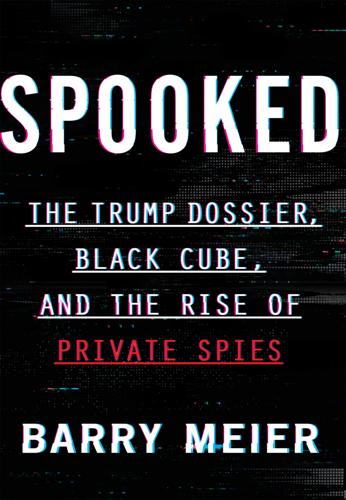
Spooked: The Trump Dossier, Black Cube, and the Rise of Private Spies
by
Barry Meier
Published 17 May 2021
Chapter 12 Trojan Wars TORONTO, 2017 It was inevitable that Black Cube, given its arrogance and sleazy tactics, would eventually fuck with the wrong people. And for the Israeli firm, those people turned out to be a group of cybersecurity experts at Citizen Lab, an organization affiliated with the University of Toronto. Founded in 2001, Citizen Lab was a Global Witness–style watchdog for the digital age, investigating how governments worldwide used new technologies to spy on their citizens and political opponents. One of its first reports to gain attention disclosed how the Chinese government was using cyber spying to monitor Tibet’s Buddhist community, including its spiritual leader, the Dalai Lama.
…
The government of Saudi Arabia had used Pegasus to infect the phones of its critics, including friends of Jamal Khashoggi, the opinion writer for The Washington Post who was murdered and dismembered by Saudi agents inside the country’s embassy in Istanbul. CITIZEN LAB’S ENCOUNTER WITH Black Cube started when a researcher with the group received an email from a man named Gary Bowman, who claimed he was an executive at a Madrid-based technology company called Flame-Tech. Bowman was eager to speak with the researcher, Bahr Abdul Razzak, who emigrated to Canada from Syria to escape the conflict there, about refugee-related initiatives that Flame-Tech wanted to support. They met at a Toronto hotel and, before long, Bowman started asking Abdul Razzak questions about Citizen Lab’s investigations into NSO, the maker of Pegasus.
…
One of its first reports to gain attention disclosed how the Chinese government was using cyber spying to monitor Tibet’s Buddhist community, including its spiritual leader, the Dalai Lama. Another investigation looked at how the Mexican government was spying on its political opponents. As part of its mission, Citizen Lab also tracked a hidden industry that produced advanced malware capable of infecting the cellphones of unsuspecting users and monitoring their conversations, emails, texts, and physical location. One kingpin of that dark domain was NSO Group, an Israeli company that produced a spyware program known commonly as Pegasus. The government of Saudi Arabia had used Pegasus to infect the phones of its critics, including friends of Jamal Khashoggi, the opinion writer for The Washington Post who was murdered and dismembered by Saudi agents inside the country’s embassy in Istanbul.
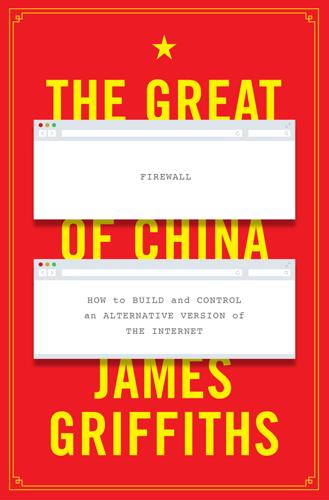
The Great Firewall of China
by
James Griffiths;
Published 15 Jan 2018
GreatFire, dubbed a “foreign anti-Chinese organisation” by the Cyberspace Administration of China,6 had long been a target of DDoS and hacking attacks, which is why it moved some of its services to Github, where they were nominally out of harm’s way. As Weaver examined the attack, he saw something new, with massive implications for cybersecurity. In a paper co-authored with Bill Marczak and seven other researchers, published by the University of Toronto’s Citizen Lab, Weaver revealed the existence of a previously unknown Chinese cyber weapon: the Great Cannon. The Citizen Lab team were able to track the Great Cannon to the same infrastructure as the Great Firewall, the colossal censorship apparatus that blocks off China’s internet from the rest of the world, and controls what every user in the country can see or share.
…
When a user visited a site with Baidu’s ads running on it, that code would request information from the company’s servers in China. As the request was processed, the Cannon would intercept a small portion of it, and swap out Baidu’s code with its own, forcing the user’s browser to continuously load the two Github projects. The attack went on for days. The Citizen Lab team said they were able to observe its effects until as late as 8 April, almost two weeks after Github’s alarms first went off. GreatFire, whose own website was also targeted, estimated that during the attack it was running up bills of over $30,000 a day with its hosting service.7 Afterwards, as the Github developers struggled to make sense of the attack and come up with a roadmap for future incidents, there was confusion within the cybersecurity community.
…
GreatFire, whose own website was also targeted, estimated that during the attack it was running up bills of over $30,000 a day with its hosting service.7 Afterwards, as the Github developers struggled to make sense of the attack and come up with a roadmap for future incidents, there was confusion within the cybersecurity community. Why had China launched so public an attack, and in such a blunt force fashion? “It was overkill,” Weaver told me. “They kept the attack going long after it had ceased working.” The Citizen Lab paper showed an incredibly sophisticated system, equal even to the Great Firewall itself, but it had been used like a hammer to repeatedly bludgeon GreatFire and Github. It was a message. * Around the same time as the Github attack, on the other side of the world, another kind of message was being delivered.
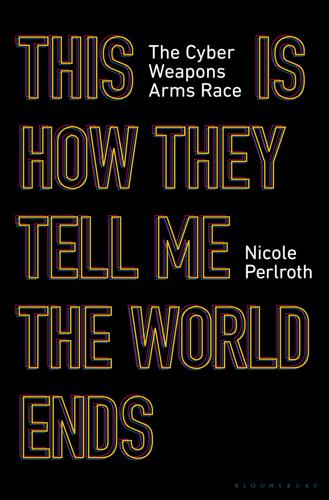
This Is How They Tell Me the World Ends: The Cyberweapons Arms Race
by
Nicole Perlroth
Published 9 Feb 2021
Had he been paying even the slightest bit of attention, he would have caught a series of disturbing stories about Hacking Team. For three years I had worked with researchers at Citizen Lab, a cybersecurity watchdog lab at the University of Toronto’s Munk School of Global Affairs, uncovering Hacking Team’s spyware in emails sent to dissidents in Bahrain, journalists in Morocco, and Ethiopian journalists in the United States. Though Hacking Team billed its tools as “untraceable,” Citizen Lab’s researchers were able to reverse-engineer and trace its spyware back to servers located in dictatorships around the world. This wasn’t data buried on some website.
…
For history on the Wassenaar Arrangement, see Raymond Bonner, “Russia Seeks to Limit an Arms Control Accord,” New York Times, April 5, 1996. The reporting on FinSpy’s spyware included in the book was taken from my own reporting in the Times, often written in conjunction with researchers at the Citizen Lab at the University of Toronto’s Monk School of Affairs. In particular, I relied heavily on research conducted by Bill Marczak, a fellow at the Citizen Lab who made these articles possible. For further reading see my 2012 accounts in the New York Times: “Researchers Find 25 Countries Using Surveillance Software,” March 13, 2013; “Elusive FinSpy Spyware Pops Up in 10 Countries,” August 13, 2012; “Software Meant to Fight Crime Is Used to Spy on Dissidents,” August 31, 2012; and “How Two Amateur Sleuths Looked for FinSpy Software,” August 31, 2012.
…
See “The Million Dollar Dissident: NSO Group’s iPhone Zero-Days Used against a UAE Human Rights Defender,” Citizen Lab, August 24, 2016, which I covered for the Times, Nicole Perlroth, “iPhone Users Urged to Update Software After Security Flaws Are Found,” August 25, 2016. See also Perlroth, “Apple Updates iOS to Patch a Security Hole Used to Spy on Dissidents,” New York Times, August 26, 2016, and Richard Silverstein, “Israel’s Cyber Security Firm ‘NSO Group’ Permits Foreign Intelligence Agencies to Spy on Human Rights Activists,” Global Research, June 20, 2017. Later Marczak, Railton, and Citizen Lab researchers Sarah McKune, Bahr Abdul Razzak, and Ron Diebert were able to tie NSO Group’s Pegasus software to operations in forty-five countries.
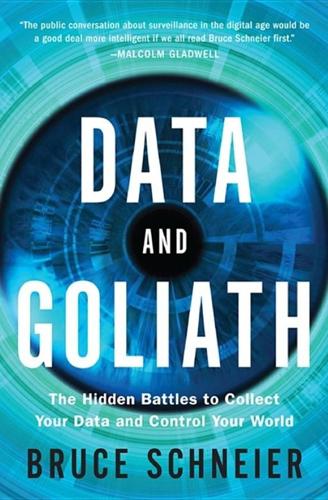
Data and Goliath: The Hidden Battles to Collect Your Data and Control Your World
by
Bruce Schneier
Published 2 Mar 2015
Irene Poetranto et al. (9 Nov 2011), “Behind Blue Coat: Investigations of commercial filtering in Syria and Burma,” Citizen Lab, Munk School of Global Affairs, University of Toronto, https://citizenlab.org/2011/11/behind-blue-coat. Irene Poetranto et al. (29 Nov 2011), “Behind Blue Coat: An update from Burma,” Citizen Lab, Munk School of Global Affairs, University of Toronto, https://citizenlab.org/2011/11/behind-blue-coat-an-update-from-burma. Morgan Marquis-Boire et al. (15 Jan 2013), “Planet Blue Coat: Mapping global censorship and surveillance tools,” Citizen Lab, Munk School of Global Affairs, University of Toronto, https://citizenlab.org/2013/01/planet-blue-coat-mapping-global-censorship-and-surveillance-tools.
…
an Italian cyberweapons manufacturer called Hacking Team: Morgan Marquis-Boire et al. (24 Jun 2014), “Police story: Hacking Team’s government surveillance malware,” Citizen Lab, Munk School of Global Affairs, University of Toronto, https://citizenlab.org/2014/06/backdoor-hacking-teams-tradecraft-android-implant. William Anderson (24 Jun 2014), “Hacking Team 2.0: The story goes mobile,” Securelist, http://securelist.com/blog/research/63693/hackingteam-2-0-the-story-goes-mobile. Ethiopia used this software: Bill Marczak et al. (12 Feb 2014), “Hacking Team and the targeting of Ethiopian journalists,” Citizen Lab, Munk School of Global Affairs, University of Toronto, https://citizenlab.org/2014/02/hacking-team-targeting-ethiopian-journalists.
…
the FinFisher toolkit: Morgan Marquis-Boire and Bill Marczak (29 Aug 2012), “The smartphone who loved me: FinFisher goes mobile?” Citizen Lab, Munk School of Global Affairs, University of Toronto, http://citizenlab.org/2012/08/the-smartphone-who-loved-me-finfisher-goes-mobile. Nicole Perlroth (30 Aug 2012), “Software meant to fight crime is used to spy on dissidents,” New York Times, http://www.nytimes.com/2012/08/31/technology/finspy-software-is-tracking-political-dissidents.html. The Moroccan government: Bill Marczak et al. (17 Feb 2014), “Mapping Hacking Team’s ‘untraceable’ spyware,” Citizen Lab, Munk School of Global Affairs, Univers-ity of Toronto, https://citizenlab.org/2014/02/mapping-hacking-teams-untraceable-spyware.
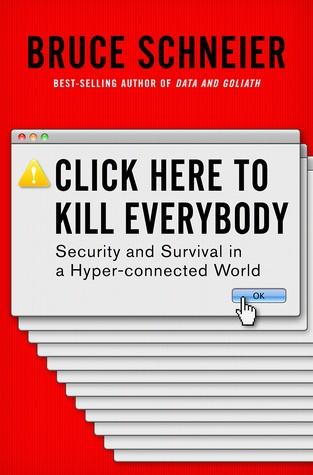
Click Here to Kill Everybody: Security and Survival in a Hyper-Connected World
by
Bruce Schneier
Published 3 Sep 2018
Chuck Seegert (8 Oct 2014), “Hackers develop DIY remote-monitoring for diabetes,” Med Device Online, http://www.meddeviceonline.com/doc/hackers-develop-diy-remote-monitoring-for-diabetes-0001. 64had used it to spy on journalists: John Scott-Railton et al. (19 Jun 2017), “Reckless exploit: Mexican journalists, lawyers, and a child targeted with NSO spyware,” Citizen Lab, https://citizenlab.ca/2017/06/reckless-exploit-mexico-nso. 64dissidents, political opponents: John Scott-Railton et al. (29 Jun 2017), “Reckless redux: Senior Mexican legislators and politicians targeted with NSO spyware,” Citizen Lab, https://citizenlab.ca/2017/06/more-mexican-nso-targets. 64international investigators: John Scott-Railton et al. (10 Jul 2017), “Reckless III: Investigation into Mexican mass disappearance targeted with NSO spyware,” Citizen Lab, https://citizenlab.ca/2017/07/mexico-disappearances-nso. 64lawyers: John Scott-Railton et al. (2 Aug 2017), “Reckless IV: Lawyers for murdered Mexican women’s families targeted with NSO spyware,” Citizen Lab, https://citizenlab.ca/2017/08/lawyers-murdered-women-nso-group. 64anti-corruption groups: John Scott-Railton et al. (30 Aug 2017), “Reckless V: Director of Mexican anti-corruption group targeted with NSO group’s spyware,” Citizen Lab, https://citizenlab.ca/2017/08/nso-spyware-mexico-corruption. 64and people who supported a tax on soft drinks: John Scott-Railton et al. (11 Feb 2017), “Bitter sweet: Supporters of Mexico’s soda tax targeted with NSO exploit links,” Citizen Lab, https://citizenlab.ca/2017/02/bittersweet-nso-mexico-spyware. 64The products of FinFisher: Bill Marczak et al. (15 Oct 2015), “Pay no attention to the server behind the proxy: Mapping FinFisher’s continuing proliferation,” Citizen Lab, https://citizenlab.ca/2015/10/mapping-finfishers-continuing-proliferation. 65And it does—through bribery: Glenn Greenwald (2014), No Place to Hide: Edward Snowden, the NSA, and the U.S.
…
Chuck Seegert (8 Oct 2014), “Hackers develop DIY remote-monitoring for diabetes,” Med Device Online, http://www.meddeviceonline.com/doc/hackers-develop-diy-remote-monitoring-for-diabetes-0001. 64had used it to spy on journalists: John Scott-Railton et al. (19 Jun 2017), “Reckless exploit: Mexican journalists, lawyers, and a child targeted with NSO spyware,” Citizen Lab, https://citizenlab.ca/2017/06/reckless-exploit-mexico-nso. 64dissidents, political opponents: John Scott-Railton et al. (29 Jun 2017), “Reckless redux: Senior Mexican legislators and politicians targeted with NSO spyware,” Citizen Lab, https://citizenlab.ca/2017/06/more-mexican-nso-targets. 64international investigators: John Scott-Railton et al. (10 Jul 2017), “Reckless III: Investigation into Mexican mass disappearance targeted with NSO spyware,” Citizen Lab, https://citizenlab.ca/2017/07/mexico-disappearances-nso. 64lawyers: John Scott-Railton et al. (2 Aug 2017), “Reckless IV: Lawyers for murdered Mexican women’s families targeted with NSO spyware,” Citizen Lab, https://citizenlab.ca/2017/08/lawyers-murdered-women-nso-group. 64anti-corruption groups: John Scott-Railton et al. (30 Aug 2017), “Reckless V: Director of Mexican anti-corruption group targeted with NSO group’s spyware,” Citizen Lab, https://citizenlab.ca/2017/08/nso-spyware-mexico-corruption. 64and people who supported a tax on soft drinks: John Scott-Railton et al. (11 Feb 2017), “Bitter sweet: Supporters of Mexico’s soda tax targeted with NSO exploit links,” Citizen Lab, https://citizenlab.ca/2017/02/bittersweet-nso-mexico-spyware. 64The products of FinFisher: Bill Marczak et al. (15 Oct 2015), “Pay no attention to the server behind the proxy: Mapping FinFisher’s continuing proliferation,” Citizen Lab, https://citizenlab.ca/2015/10/mapping-finfishers-continuing-proliferation. 65And it does—through bribery: Glenn Greenwald (2014), No Place to Hide: Edward Snowden, the NSA, and the U.S.
…
At the same time, hackers can add insecurities through customers’ back-room modifications to take control. GOVERNMENTS ALSO USE THE INTERNET FOR SURVEILLANCE AND CONTROL Governments want to surveil and control us for their own purposes, and they use the same insecure systems that corporations have given us to do it. In 2017, the University of Toronto’s research center Citizen Lab reported on the Mexican government’s surveillance of what it considered political threats. The country had purchased surveillance software—spyware—from the cyberweapons manufacturer NSO Group, and had used it to spy on journalists, dissidents, political opponents, international investigators, lawyers, anti-corruption groups, and people who supported a tax on soft drinks.
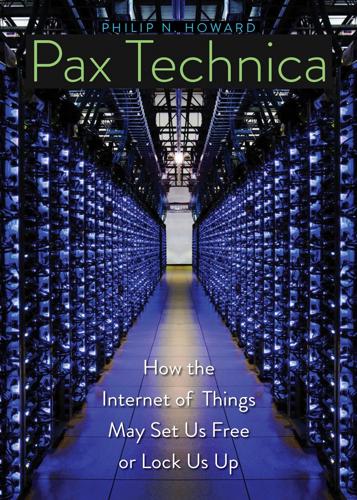
Pax Technica: How the Internet of Things May Set Us Free or Lock Us Up
by
Philip N. Howard
Published 27 Apr 2015
Eghna’s website touts the @LovelySyria bot as one of its most successful creations because it built a community of people who supposedly just admire the beauty of the Syrian countryside; the company has denied directly working for the Syrian government.26 But @LovelySyria has few followers and not much of an online community presence. With two tweets a minute, Twitter itself decided to stop @LovelySyria from devaluing a socially important hashtag. Of course, automated scripts are not the only source of computational propaganda. The Citizen Lab and Telecommix found that Syrian opposition networks had been infected by a malware version of a censorship circumvention tool called Freegate.27 So instead of being protected from surveillance, opposition groups were exposed. And a social media campaign by a duplicitous opposition cleric was cataloguing his supporters for the government.
…
The Ethiopian government watches even those political opponents who are part of the cultural diaspora living in other countries.50 Blue Coat Systems manufactures equipment to secure digital data, but the same equipment can restrict internet access for political reasons, and monitor and record private communications. When the Citizen Lab’s researchers went looking to see where such devices were popping up on public networks, they spotted them as far afield as Syria, Sudan, and Iran—countries supposedly already subject to U.S. sanctions.51 But it is not just that people learn about new software from friends, family, and colleagues, or that countries sharing political perspectives also share technologies.
…
Eman Abdelrahman’s “We Are All Laila” project inspired a cohort of young Egyptians to think collectively about their problems and what they could do about them. Brown Moses diligently does his documentary work on Syrian munitions. Other crypto clubs—such as the Tactical Technology Collective and Citizen Lab—develop the software workarounds that let people in closed regimes get access to the internet.20 Because these hacktivists are so well connected, governments that go after them risk upsetting extended networks of tech-savvy people. Arbitrary arrest, secret trials, and long periods of detention without charge remain a common way of going after bloggers and other online activists, even in the West.21 Because of social media, news of arrests spreads quickly, and trials are harder to keep secret.

Catch and Kill: Lies, Spies, and a Conspiracy to Protect Predators
by
Ronan Farrow
Published 14 Oct 2019
A middle-aged man with a neat white beard, who identified himself as Michael Lambert, sat down for lunch with John Scott-Railton, a researcher for the watchdog group Citizen Lab. Lambert had said he worked for the Paris-based agricultural technology firm CPW-Consulting, and asked to meet about Scott-Railton’s doctoral research on using kite-mounted cameras to create maps, which is a thing, apparently. But as food arrived, Lambert’s interests strayed. Citizen Lab, which tracks state-backed efforts to hack and surveil journalists, had recently reported that NSO Group’s Pegasus software compromised an iPhone belonging to a friend of the journalist Jamal Khashoggi, not long before Saudi operatives cut Khashoggi to pieces with a bone saw.
…
Citizen Lab, which tracks state-backed efforts to hack and surveil journalists, had recently reported that NSO Group’s Pegasus software compromised an iPhone belonging to a friend of the journalist Jamal Khashoggi, not long before Saudi operatives cut Khashoggi to pieces with a bone saw. The investigation had prompted sharp criticism of NSO Group, which denied that its software was used to target Khashoggi but also refused to answer questions about whether the software had been sold to the Saudi government. Lambert wanted to know about Citizen Lab’s work on NSO Group. He asked whether there was any “racist element” to the focus on an Israeli group. He pressed Scott-Railton about his views on the Holocaust. As they spoke, Lambert took out a black pen with a silver clip and a chrome ring on its barrel. He laid it just so on a legal pad in front of him, tip pointed at Scott-Railton.
…
On his luggage was a tag bearing the name “ALMOG” and a home address in Israel. This name was real: the agent was Aharon Almog-Assouline, a retired Israeli security official later reported to have been involved in a string of Black Cube operations. Black Cube and NSO Group would later deny any connection to the operation against Citizen Lab. But in many of the meetings Ostrovskiy had described to me over the preceding months, Almog-Assouline had been there, appearing to target figures who criticized NSO Group and argued that its software was being used to hunt journalists. Black Cube was furious about the botched operation. The agency ordered that everyone with knowledge of the matter be polygraphed immediately.

Mbs: The Rise to Power of Mohammed Bin Salman
by
Ben Hubbard
Published 10 Mar 2020
Soon, he learned that his brother’s earlier warning about the kingdom watching him had been more correct than either of them realized at the time. In August, researchers from Citizen Lab inspected his phone and found the suspicious text message he had received in June, the same day I had received mine. It looked like a tracking notification from DHL, but contained a link to a website called sunday-deals.com. Abdulaziz had clicked on the link, letting the kingdom’s hackers into his phone—and presumably into his chats with Khashoggi. As soon as Citizen Lab confirmed the hack, Abdulaziz warned Khashoggi that the kingdom could have intercepted all their communications—about MBS, about DAWN, about the electronic bees.
…
I didn’t click on the link, and so didn’t think the hackers were inside my phone, but the mere attempt suggested that the stakes of reporting on Saudi Arabia and MBS had gone up. At least four others were targeted around the same time: two prominent Saudi dissidents in London, a researcher for Amnesty International, and a Saudi activist in Canada named Omar Abdulaziz. Technology researchers with a group called “Citizen Lab” at the University of Toronto concluded that hackers linked to Saudi Arabia had launched the attacks with software from NSO Group, an Israeli company. Some of the targets had fallen into the trap, including Abdulaziz, who had recently struck up a friendship with Khashoggi. (A spokesperson for NSO Group said the company did not comment on specific cases but that its product was “not a tool to target journalists for doing their job or to silence critics.”)
…
looking for funding: Author interviews, Tamimi, and Radwan Masmoudi, Oct. 2018. “we’ll just go quiet”: Khashoggi’s full lecture is at “CSID 19th Annual Luncheon Jamal Khashoggi,” YouTube video, May 2, 2018. https://www.youtube.com/watch?v=MUq4FC31Rlg eavesdrop on my conversations: Author interviews, Ron Diebert and Bill Marczak of Citizen Lab at the University of Toronto, Oct. 2018. They inspected the message and concluded it was from hackers connected to Saudi Arabia. Saudi dissidents in London: “Exclusive: Saudi Dissidents Hit With Stealth iPhone Spyware Before Khashoggi’s Murder,” Forbes, Nov. 21, 2018. The dissidents were Yahya Assiri, who ran a human rights monitor, and Ghanim Al-Masarir, who had a satirical YouTube program.
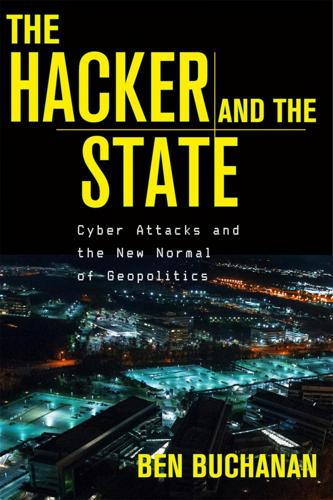
The Hacker and the State: Cyber Attacks and the New Normal of Geopolitics
by
Ben Buchanan
Published 25 Feb 2020
Ambassador’s Emails,” Daily Beast, June 2, 2017; Adam Hulcoop, John Scott-Railton, Peter Tanchak, Matt Brooks, and Ron Deibert, “Tainted Leaks: Disinformation and Phishing with a Russian Nexus,” Citizen Lab, May 25, 2017; Scott Shane, “The Age of Big Leaks,” New York Times, February 2, 2019. 26. David Ignatius, “How a Chilling Saudi Cyberwar Ensnared Jamal Khashoggi,” Washington Post, December 7, 2018. 27. For examples, see Kim Zetter, “Hacking Team Leak Shows How Secretive Zero-Day Exploit Sales Work,” Wired, July 24, 2015; Bill Marczak, Claudio Guarnieri, Morgan Marquis-Boire, and John Scott-Railton, “Hacking Team and the Targeting of Ethiopian Journalists,” Citizen Lab, February 12, 2014; Alex Kane, “How Israel Became a Hub for Surveillance Technology,” The Intercept, October 17, 2017; Joel Schechtman and Christopher Bing, “UAE Used Cyber Super-Weapon to Spy on iPhones of Foes,” Reuters, January 30, 2019. 28.
…
Ash Carter, “A Lasting Defeat: The Campaign to Destroy ISIS,” report, Belfer Center for Science and International Affairs, October 2017, 32–33. 14. Costin Raiu, Mohamad Amin Hasbini, Sergey Belov, and Sergey Mineev, “From Shamoon to StoneDrill,” Kaspersky SecureList, March 6, 2017; Bill Marczak, Nicholas Weaver, Jakub Dalek, Roya Ensafi, et al., “China’s Great Cannon,” research brief, Munk School of Global Affairs, Citizen Lab, April 10, 2015. 15. Kaspersky Lab Global Research and Analysis Team, “OlympicDestroyer Is Here to Trick the Industry,” SecureList, March 8, 2018; Greenberg, Sandworm, 257–265. 16. Nicole Perlroth and Clifford Krauss, “A Cyberattack in Saudi Arabia Had a Deadly Goal. Experts Fear Another Try,” New York Times, March 15, 2018; Raiu, Hasbini, Belov, Mineev, “From Shamoon to StoneDrill”; Blake Sobczak, “The Inside Story of the World’s Most Dangerous Malware,” E&E News, March 7, 2019; FireEye Intelligence “TRITON Attribution: Russian Government-Owned Lab Most Likely Built Custom Intrusion Tools for TRITON Attackers,” FireEye Threat Research blog, October 23, 2018; Dragos, “TRISIS Malware: Analysis of Safety System Targeted Malware,” Dragos report, December 13, 2017. 17.
…
Howard, Bharath Ganesh, Dimitra Liotsiou, John Kelly, and Camille François, “The IRA, Social Media and Political Polarization in the United States, 2012–2018,” University of Oxford, Computational Propaganda Research Project, report, December 2018; Kevin Roose, “Is a New Russian Meddling Tactic Hiding in Plain Sight?,” New York Times, September 25, 2018. 21. Gabrielle Lim, Etienne Maynier, John Scott-Railton, Alberto Fittarelli, Ned Moran, and Ron Deibert, “Burned after Reading: Endless Mayfly’s Ephemeral Disinformation Campaign,” Citizen Lab threat research report, May 14, 2019; “Taking Down More Coordinated Inauthentic Behavior,” Facebook corporate communications news release, August 21, 2018; Jack Stubbs and Christopher Bing, “Exclusive: Iran-Based Political Influence Operation–Bigger, Persistent, Global,” Reuters, August 28, 2018. 22.
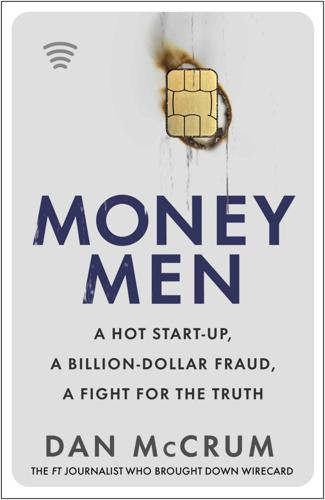
Money Men: A Hot Startup, a Billion Dollar Fraud, a Fight for the Truth
by
Dan McCrum
Published 15 Jun 2022
His kids enjoyed sticking their heads round the door to see, then going to the living room to watch their dad on the screen telling the lunchtime audience what was going on and how he’d been targeted for years by a malevolent financial institution. Earl could talk about the hacking because, at long last, a week before Wirecard imploded, Citizen Lab in Toronto published an investigation into the Indian hacker gang BellTroX which the report said had targeted him, me, Oliver Cobb and all the other Wirecard critics. It was the Reuters journalist Alasdair Pal who had brought the hackers to Citizen Lab’s attention, and it was thanks to Earl, and Wirecard’s relentless pursuit of him over multiple years, that the researchers were able to track the hackers’ evolving tactics and shifting digital locations.
…
In a basement interview room under the heavily fortified offices of the Department of Justice for the Southern District of New York, Earl faced two Federal investigators focused on the hacking of Wirecard critics. He was an expert, because the phishing emails never stopped, just varied in intensity, ingenuity and effort, as if he was being passed around the hacking organization as an unresolved project. Earl sent all of these on to Citizen Lab at the University of Toronto, a group of ‘white-hat’ academics who studied, and sometimes exposed, online surveillance in all its noxious forms. Earl and I, along with other targets of Wirecard hacking, had agreed to keep quiet about the US investigation in the hope that it would lead to prosecutions of those involved, a promise we began to regret as nothing happened and the battle in Germany intensified.
…
‘Shan’ 134–5, 271–2 Singapore arrest 304 short sellers xi and Wirecard 31–4 Carson Block 36–7 surveillance 255–7 see also specific persons/stories Shubber, Kadhim 254–5 Sigma Trading 181 Silks, Murphy on 4–5 Silverman, Gary 20, 21, 36 Silverstein, Martin 178 Sino Forest 93 Sino Forest scam 36–7 Skripal, Sergei, GRU and 268 SmartE, O’Sullivan and 250 Smaul, Simon, and G2Pay xi, 39, 42–4 client loss 45–6 and Marsalek 49–50, 65–6 and miscoded 7995 transactions 42–4 and Sunsont nutraceutical processing 60–63, 65–6 and Third-Party Acquiring 200 leaves G2Pay 60 whistleblower 258–9 Smith, Herbert 246 SoftBank 249, 288 Vision Fund 145, 197–8 loan to Wirecard 197–200, 203, 205, 210, 236–9 Mubadala actual lender 238 Southern Investigative Reporting Foundation 146, 147n Steinhoff, Daniel, Project Tiger 155–8, 226 Stephens, Philip 257 Stoeckl, Iris 144 at London presentation 111 on shorters and Ashazi 72–3, 74, 77 Stolkin, Hugo 88 Stone, Brian, Al Alam meeting 277 Storbeck, Olaf 249, 297 Braun offers interview 259–60 Straub, Markus (SdK), on Wirecard accounts 32–4 Süddeutsche Zeitung 263 on Marsalek’s escape 300 Sun Tzu, The Art of War 65 Sundaram, Kritin 203 Sunday Business 53–4 Sunsont 60–63, 65–6 Sururi, Nasreen, on Wirecard/Ashazi 70, 73 surveillance dossier 257 Sweeting’s 53 Symtric (Al Alam) 277 Systems@Work 66 Taleb, Sina 118 and Marsalek 147, 148 TecDAX 25, 28 Telegram 81–2 Wirecard and 163 Tett, Gillian (FT), on hedge funds 36 ‘The Count’ 266 theatres, high-risk processing 43 Third-Party Acquiring 200–203 Timo (German lawyer) 142–3, 208 Tolentino, Mark 293, 304 Manila trustee meeting 272–5 protests innocence 300 Toronto University Citizen Lab 208 on Indian hacker gang BellTroX 298–9 Trautmann, Rüdiger xi, 45, 61, 63, 97, 98, 116 and Inatec 46 police take inbox archives 101–3, 104 Wirecard accounts concerns 27–8, 31, 44 Trump, Donald 163, 169, 199, 253, 268 GRU and 268 Turkish boxers 33–4 Uber 145 UBS, and Wirecard/Deutsche Bank proposal 231 UK, gambling-friendly jurisdiction 43 UK Insolvency Service, and Dowson shell companies 122 UK police refuse raid on Earl and Perring 141 Ukraine, GRU and 268 Unlawful Internet Gambling Enforcement Act 2006 (USA) 29 US college football betting 43 US FBI, on Wirecard critics hacking 208 US police, Wirecard money laundering probe 2015 101–3, 104 Valiant Capital 210 Vanranen, David 78 Viceroy Research 226, 305 Visa/Mastercard membership, XCOM bank 27 Visa and miscoded 7995 transactions 42 Project Tiger summary papers sent to 167–8 Wirecard crackdown 2009/10 48–9, 58 von Erffa, Stephan 251 arrested 303 KPMG report meeting 290 Wirecard deputy CFO 138 von Knoop, Alexander x, 174, 175, 230, 290, 291, 292, 295 Wagner, Denis 47 and Click2Pay 13–17 joins Wirecard sales team 9–11, 13 prepaid credit cards misgivings 18, 19 sacked 19 Wagner Group soldiers 268–9 Wall Street Journal 20, 238 WalPay, Isle of Man 102 Warburg 109 Weiss, Martin 279, 300 arrested 303 former Austria BVT head 280 on Russian Diplomat as former spy 280 Westcott, Mark 185 WeWork 145, 198 White, Alan, refuses to talk 245–6 Wickford Network 283–4 Willms, Jesse 47–9 Wirecard accounts, early years 25–34, 44–5, 65, 90–92, 110 and Allied Wallet 210–11 and Allscore Beijing 250 and Ashazi Services Bahrain 67–71, 72–7 Asian takeovers 67–71, 72–7 non-offices, investor confidence in 93–4 AsiaPacific deal with Citigroup 145–6, 152–3 BaFin ban on short selling 180 and Banc de Binary 211 Bauer-Schlichtegroll buys for porn billing 12–13 leaves/divests 30–31, 46 Bavarian police 2015 raid 101–3 and Bijlipay card reader 80–81 and Bitcoin 249–50 Boyd on 146–7 and CenturionBet 102n Chinese purported bid for 112 Christmas party 2009 49–50 and DAX 30 28, 236, 287, 288 DAX Index membership 156, 159–60 and Deutsche Bank 27 and Dowson 122 Einsteinring Park, move to 63–4 Enterprise Portal 41–2 Ernst & Young see Ernst & Young FT investigations/stories see Financial Times G2Pay payment processor see G2Pay German press support 110 Gibraltar office 31, 40, 77 Hempton on 56 Hermes i-Tickets smartshops 78–89 1A/Hermes deal 84–9 Hermes HQ shown to analysts 94 Ramasamy brothers falling-out 155 and high-risk processing 43–4, 47 ICC-Cal cash stolen 50–51 Ingenico, purported bid for 108, 117–18 and Irish dissolved companies 211 Jakarta offices, shown to analysts 94 KPMG investigation/aftermath draft report to supervisory board 286–90 no profit from European payment processing 286 Ebitda from purported partner commissions 286–7 investor base hopeful 289, 295 management spins on 283, 285 parliamentary inquiry 302–3 stock drops 291, 292, 295 Wirecard announces 1.9bn missing 295 see also Braun, Markus; KPMG; Marsalek, Jan Macquarie meeting on 139–40 management/finances cash in carrier bags 182 customers, high processing fees 284 delayed financial results 285 executive board meetings, no minutes 287 files for insolvency 296, 304 imaginary clients story 248–52 money always tight 258–9 see also Braun, Markus; Marsalek, Jan Merchant Cash Advances (MCAs) 236–7 and online gambling 14–17, 97 Pennsylvania office 226 people ix–xi Philippines office 57–8 rolling reserve deposits 45 SdK concerns and stock drop 31–4 Singapore office 49, 94, 133–5, 153–60, 174–5, 188–9, 301 finance team investigation 155–8 Gill on 161–3 police raid 176 Systems@Work 66 trustee accounts 271–2 whistleblowers 154–5, 156, 158, 161–3 and SoftBank 197–200, 203, 205, 210 SoftBank loan 236–9 Mubadala actual lender 238 on stock market 17 supervisory board and KPMG findings 287–90 and suspicious loans 288 gives KPMG one more week 289 meeting 232 supports Braun/Marsalek 289, 294–5 systems self-destruct 2016 103–4 in TecDAX 25, 28 and Telegram 163 Third-Party Acquiring, as cover story 258–9 McKinsey on 234, 235 internal audit and Third-Party Acquiring 201 nonexistent (KPMG) 291 trustee accounts 259, 271–2, 272–5 and UK shell companies 43–4 UK & Ireland office 245–6 US money laundering probe 2015 101–3, 104 Visa fines, freeze 58, 64 WireBank proposal 239 Wirecard Bank (formerly XCOM bank) 26–31 Schütt investigated 59 statement for ConePay 189–90 XCOM bank 26–8 Zatarra and, see Zatarra Wirtschaftswoche, on Al Alam 261 Wise Men (Perring’s) 98, 111 Withers Hong Kong lawyers, Al Alam meeting 276–7 Wright, Craig 223 XCOM bank, Wirecard buys 26–8 Yasmineh, David, Al Alam meeting 276–7 Zatarra Report 2016 104, 105–13, 144, 177, 183, 184, 185–6, 214, 236, 257, 303 accusatory faked email from 117 BaFin on market manipulation 109 demand to name people in 124–6 Earl and Perring face prosecution 141–3 fourth man 110–11 harassment by Wirecard agents 124–32 Kroll to investigate 117–19 Marsalek’s security to investigate 116–19 outed on Twitter 127 weaknesses 109–12 website attacked 109 Zatarra Research and Investigations 100 THIS IS JUST THE BEGINNING Find us online and join the conversation Follow us on Twitter twitter.com/penguinukbooks Like us on Facebook facebook.com/penguinbooks Share the love on Instagram instagram.com/penguinukbooks Watch our authors on YouTube youtube.com/penguinbooks Pin Penguin books to your Pinterest pinterest.com/penguinukbooks Listen to audiobook clips at soundcloud.com/penguin-books Find out more about the author and discover your next read at penguin.co.uk TRANSWORLD UK | USA | Canada | Ireland | Australia India | New Zealand | South Africa Transworld is part of the Penguin Random House group of companies whose addresses can be found at global.penguinrandomhouse.com.
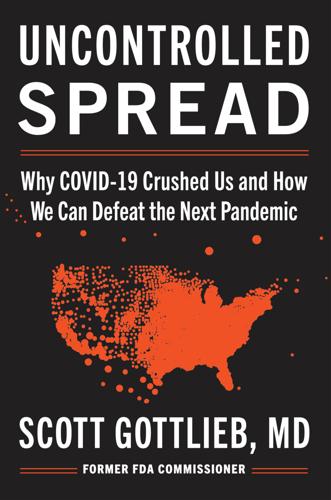
Uncontrolled Spread: Why COVID-19 Crushed Us and How We Can Defeat the Next Pandemic
by
Scott Gottlieb
Published 20 Sep 2021
“No creating rumors, no believing rumors, no spreading rumors,” local authorities and state media posted on the eight individuals’ Weibo pages after their arrest.26 “Rumor is a kind of virus that is worth more of our attention than real viruses sometimes,” the state-run People’s Daily wrote on its website.27 ProPublica would later track more than ten thousand Chinese government-linked influence accounts on Twitter that had previously targeted political dissidents and the Hong Kong protests, but now began to train their attention on reports related to the outbreak.28 A subsequent study by the Citizen Lab at the University of Toronto found that the Chinese government began censoring postings about the virus beginning December 31, when the first news of the outbreak started to circulate. Between January 18 and May 14, Citizen Lab found 2,174 keywords related to COVID that were suppressed on WeChat.29 Many of the deleted posts, they found, were criticizing the Chinese government officials for how they handled the initial response.
…
Agencies Find,” New York Times, September 17, 2020. 21.Yu et al., “In Depth: How Early Coronavirus Signs Were Spotted and Throttled.” 22.Kristin Huang, “Coronavirus: Wuhan Doctor Says Officials Muzzled Her for Sharing Report on WeChat,” South China Morning Post, March 11, 2020. 23.Reporters Without Borders, “Whistleblowing Doctor Missing After Criticizing Beijing’s Coronavirus Censorship,” April 14, 2020. 24.Jianxing Tan, “新冠肺炎"吹哨人"李文亮:真相最重要” [“Covid-19 “Whistleblower” Li Wenliang: the Truth is Most Important”], Caixin, January 31, 2020. 25.Lin Zehong, “‘Whistleblower’ of Wuhan Pneumonia: I Knew It Could Be ‘Person-to-Person’ Three Weeks Ago,” United Daily News, January 31, 2020. 26.Michelle Chan, “Beijing Urges Calm over Mysterious Virus Ahead of Lunar New Year,” Nikkei Asia, January 8, 2020. 27.Chan, “Beijing Urges Calm over Mysterious Virus Ahead of Lunar New Year.” 28.Jeff Kao and Mia Shuang Li, “How China Built a Twitter Propaganda Machine Then Let It Loose on Coronavirus,” ProPublica, March 26, 2020. 29.Masashi Crete-Nishihata et al., “Censored Contagion II: A Timeline of Information Control on Chinese Social Media during COVID-19,” Citizen Lab, August 25, 2020. 30.On December 30, the health commission sent an “urgent notice” to all hospitals about the existence of “pneumonia of unclear cause”—but omitted any mention of SARS or a coronavirus. The health commission also ordered all health departments to immediately compile and report information about known cases.
…
See Wuhan outbreak personal protective equipment, 162–63 RaTG13, 4–5, 462n repatriation of Americans, 21–22, 24, 188 SARS outbreak, 14–15, 40–41, 44, 53, 57–58, 182, 282, 350, 351, 359–60, 378, 391–92 social distancing, 214 tracking and reporting cases, 230 vaccines, 320, 323–24, 337–38, 457n WHO and, 20–21, 31–34, 36–39, 43, 44–45 China, and origins of SARS-CoV-2, 3, 5, 14–15, 29–36, 39–40, 353–63, 370–71, 379 first cases, 26–27, 39–40 genetic sequencing, 27–28, 29–30, 33–34, 35–37, 53–54 initial reporting, 14–15 lab leak theory, 354–65, 379, 461n Wuhan’s Huanan Seafood Market, 15, 26–27, 31, 34–35, 37, 48–49, 70, 373, 406n China National Health Commission, 30, 36, 42–43, 50 Chinese government censorship, 31–34, 36–43, 46, 47–54, 57, 353–54 CDC’s lack of access, 47–50 death of Li Wenliang, 30–31, 42 early samples of SARS-CoV-2, 32–34, 37–38, 39–41 reporting requirements, 32–34, 37–38, 42–44, 51, 182 Chinese Center for Disease Control and Prevention, 48, 49–50, 359, 360 Chinese Communist Party (CCP), 50 Chiron Corp., 180, 275–76 Chloroquine (hydroxychloroquine), 290–96, 450n Christakis, Nicholas, 344 Christie, Chris, 308–9, 383 Chu, Helen, 62–72, 84 CIA (Central Intelligence Agency) vaccine program in Pakistan, 369–70 World Intelligence Review, 368 Cities Readiness Initiative, 187 Citizen Lab, 31–32 Clinical trials, 286–90 of Pfizer vaccine, 333–36 Clinton, Bill (Clinton administration), 341–42 CNBC, 19, 23, 85, 87, 138, 263, 335–36 Coalition for Epidemic Preparedness Innovations (CEPI), 283–84 Cobas PCR, 149–50 Coffee shops, 243 Cohen, Mandy, 153 Collecting patient samples, 29, 121–22, 128, 272–74 Community mitigation.
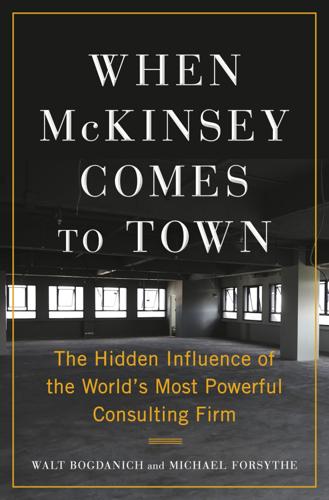
When McKinsey Comes to Town: The Hidden Influence of the World's Most Powerful Consulting Firm
by
Walt Bogdanich
and
Michael Forsythe
Published 3 Oct 2022
That May, Saudi emissaries traveled to Montreal to urge Abdulaziz to return to his homeland. As a young, hip YouTube star, he’d be a celebrity, they told him. As an added incentive, they brought along his brother to help to convince him. Abdulaziz demurred. The following month, his phone was hacked, though he was unaware of it for months, according to a report by the Citizen Lab, an organization at the University of Toronto that investigates digital espionage against civil society. In August, Abdulaziz’s two brothers were thrown in jail. Another influential online critic highlighted in the McKinsey report was also arrested, and a third account deemed negative by McKinsey disappeared from Twitter.
…
GO TO NOTE REFERENCE IN TEXT The banal title of the nine-page report: The New York Times reporter Katie Benner obtained a copy of this report in late 2018, and an identical version was entered as an exhibit in a lawsuit Abdulaziz filed against McKinsey. The PowerPoint presentation was reviewed by a former McKinsey consultant familiar with sentiment analysis who confirmed that this was the technique being employed. GO TO NOTE REFERENCE IN TEXT The following month, his phone was hacked: Citizen Lab, “How a Canadian Permanent Resident and Saudi Arabian Dissident Was Targeted with Powerful Spyware on Canadian Soil,” Oct. 22, 2018. GO TO NOTE REFERENCE IN TEXT “We will anesthetize you”: Account of Khashoggi’s murder, based on audio recordings, from Hubbard, MBS, 262–64.
…
Health System Reform, 64 Centers for Medicare and Medicaid Services (CMS), 70–71 Central Intelligence Agency (CIA), 3 Cerberus Project, 118–19 Chambers, Susan, 44 Channel 4 News (Britain), 251, 261 Chase Manhattan Bank, 171, 174, 176–80 Chaskalson, Matthew, 229, 241–42 Chavez, Cesar, 82 Chen Fenjian, 91–92 Chengdu McKinsey Management Consulting, 99 Chen Guang, 103, 108 Chernobyl (TV miniseries), 2 Cheung, Louis, 97 Chevron, 163–64 Chewning, Eric, 93 Chicago Cubs, 216 Chicago office, 55, 150, 231 Chicago White Sox, 205, 215 Chief Strategist Roundtable Dinner, 267 children and teenagers ICE family separation and, 75, 83 immunization and, 45 Missouri Medicaid and, 60 opioids and, 132, 142 vaping and, 123–29 Childress, Trey, 55 China, 45–46, 91–109, 152, 165–66, 189, 196, 233, 257, 279 China Communications Construction Company, 91–93, 100–102 China Construction Bank, 108 China Economic Weekly, 99 China Merchants Group, 103, 108 China Mobile, 99 China National Offshore Oil Corporation (CNOOC), 166 China National Petroleum Corporation (CNPC), 166 China Smart City Expo (2019), 104 China Telecom, 99, 108 Chinese Commerce Ministry, 99 Chinese Communist Party, 92, 94, 96, 98, 100–101, 103, 105, 107–8 Chinese National Development and Reform Commission, 99 Chinese Navy, 92n, 93 Chinese State–Owned Assets Supervision and Administration Commission (SASAC), 107–8 Chopra, Manish, 28–29 Chrysler, 32 Chui, Michael, 127, 150 Churchill, Winston, 258 cigarettes, 73, 110–18 Cirque du Soleil, 267 Cisco, 40 Citibank, 171, 174–77, 180 Citizen Lab, 253 Claims Core Process Redesign System, 194, 199 Clee, Gilbert, 23 Cleveland Indians, 216–18 Clevinger, Mike, 217 Climate Accountability Institute, 163 “Climate Breaking Points” panel, 150 climate change, 17, 20, 150–60, 163, 166–68 Clinton, Bill, 94, 96, 100, 244, 265 CNBC, 8, 255–57 CNN, 84 coal, 28, 99, 156–62, 164–68, 224, 226 “Coal Processing Optimization” report, 165 Cole, Bob, 133 collective bargaining, 34 Colossus system, 194, 202–3 Columbia (Disneyland riverboat) accident, 12 Communications Workers of America (CWA), 48–49 compensation consultants, 33–35, 42 Congressional Budget Office, 63 Conservative Party (Britain), 262–75 Consumer Federation of America, 198, 203 Continental Illinois Bank, 175, 177–80, 186, 207 CoreCivic (formerly Corrections Corporation of America), 80–81 Cornell University, 21 corruption, 25–26, 30, 225–41, 250.
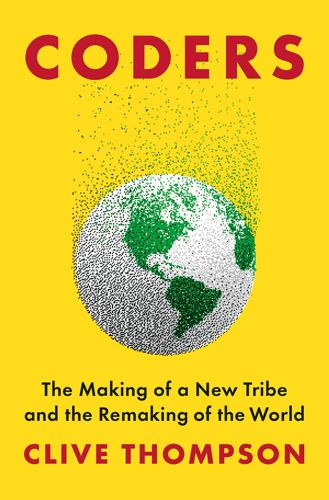
Coders: The Making of a New Tribe and the Remaking of the World
by
Clive Thompson
Published 26 Mar 2019
Meanwhile, Chinese state-sponsored hackers are busily penetrating US firms and government agencies: The Department of Defense blocks 36 million phishing attempts each day. And in every authoritarian country, government-sponsored hackers busily wage attacks on civil society advocates and pro-freedom groups—installing spyware on dissidents, the better to bust them. Work by Citizen Lab has found extensive spyware espionage conducted against Tibetan activists and humanitarians, to name just one example. And the US, of course, has its own phalanxes of government-employed hackers, busily developing malware and exploits with which to attack other countries. Indeed, the exploit that WannaCry employed was originally developed by the NSA, probably as a strategy they intended to use against another state—but it was released online when the NSA itself was hacked.
…
Blocks 36M Malicious Emails Daily, Fends off 600 Gbps DDoS Attacks,” Cybersecurity Source, January 19, 2018, accessed August 19, 2018, https://www.scmagazine.com/defense-dept-blocks-36m-malicious-emails-daily-fends-off-600-gbps-ddos-attacks/article/738292. to name just one example: Masashi Crete-Nishihata, Jakub Dalek, Etienne Maynier, and John Scott-Railton, “Spying on a Budget: Inside a Phishing Operation with Targets in the Tibetan Community,” The Citizen Lab, January 30, 2018, accessed August 19, 2018, https://citizenlab.ca/2018/01/spying-on-a-budget-inside-a-phishing-operation-with-targets-in-the-tibetan-community. when the NSA itself was hacked: Lily Hay Newman, “The Leaked NSA Spy Tool That Hacked the World,” Wired, May 7, 2018, accessed August 19, 2018, https://www.wired.com/story/eternalblue-leaked-nsa-spy-tool-hacked-world.
…
See minority coders Black Girls Code, ref1 #blacklivesmatter, ref1 Black Mirror (TV show), ref1 Blaze, Matt, ref1, ref2 “Bless” function, ref1 blockchain technology, ref1 Block Together app, ref1 blogging, ref1 Bloomberg, Michael, ref1 blue-collar coding, ref1 aptitude testing and, ref1 boot camps, ref1, ref2 children, computer programming education for, ref1 coal miners in KY learn coding at Bit Source, ref1 computer science degree programs, ref1 demand for coders, explosion in, ref1 job training, ref1, ref2 mainstreaming of coding, ref1 nontraditional fields, benefits of hiring workers from, ref1 self-taught coders, ref1, ref2 women and minorities and, ref1 Blue Gene, ref1 Blum, Lenore, ref1 Bogachev, Evgeniy Mikhailovich, ref1 Bogost, Ian, ref1, ref2 Booch, Grady, ref1 Boole, George, ref1 Boos, Hans-Christian, ref1 boot camps, ref1, ref2 Flatiron School, ref1, ref2, ref3 Geekskool, ref1 hiring rates for graduates of, ref1 types of coding graduates are prepared to do, ref1 vocational training nature of, ref1 Boston Globe, ref1 Bostrom, Nick, ref1, ref2 Bosworth, Andrew, ref1 botnets, ref1 boyd, danah, ref1, ref2, ref3 Braithwaite, Gwen, ref1 Brandeau, Greg, ref1 Brandon, Richard, ref1 break points, ref1 Breisacher, Tyler, ref1, ref2, ref3 Brewer, Johanna, ref1 Brin, Sergey, ref1 brogrammers, ref1, ref2 Broken Age (game), ref1 Brooks, Fred, ref1, ref2 Brotherhood, Oliver, ref1 Brotopia (Chang), ref1 Brown, Barrett, ref1, ref2 bug bounties, ref1 bugs, ref1 defined, ref1 examples of, ref1 fixing (See debugging) GetCalFresh app and, ref1 Netscape design and attitude regarding, ref1 origins of term, ref1 penetration testers and, ref1 self-esteem of coders and, ref1 triumph and elation in solving, ref1 unpredictability and abruptness of programming “wins,” ref1 user behavior and, ref1 Bulletin Board Systems (BBSes), ref1 Bunner, Andrew, ref1, ref2 Buolamwini, Joy, ref1 Burbn, ref1 Burke, Tarana, ref1 Burkhart, Annalise, ref1 Businessweek, ref1 Buyukkokten, Orkut, ref1 BuzzFeed, ref1, ref2 ByteDance, ref1 Cahill, Matt, ref1 Caldbeck, Justin, ref1 Callahan, Ezra, ref1 Cambridge Analytica scandal, ref1 Campbell, Donald, ref1 Campbell’s Law, ref1 Cannon, William, ref1 Cantrill, Bryan, ref1 capacity crisis, ref1 capitalism, and coding, ref1 CAPTCHA tests, ref1 Carmack, John, ref1 Carnegie Mellon University (CMU) computer science program, ref1, ref2, ref3, ref4 Carr, Nicholas, ref1 Catalyte, ref1 Cegłowski, Maciej, ref1 Chang, Emily, ref1, ref2, ref3 Chaos Monkeys (Martínez), ref1 Charlebois, Andrew, ref1 chatbots, ref1 Chawla, Rameet, ref1 children, computer programming education for, ref1 Choe, David, ref1 Chou, Tracy, ref1, ref2 Churchill, Elizabeth, ref1 Citizen Lab, ref1 Citron, Danielle, ref1 city planners, ref1 civic impacts of big tech, ref1, ref2 bias in algorithmic ranking systems and, ref1 coding employees power to pressure for change, ref1 engineers’/designers’ failure to see negative ways sites would be used, reasons for, ref1 free-to-use model, effects of, ref1 measures to combat harassment at big social networks, ref1 microtargeting and, ref1 presidential campaign of 2016, ref1, ref2 reforming big tech, ref1 Twitter and, ref1 civil engineers, ref1 civil liberties, hacking to protect.
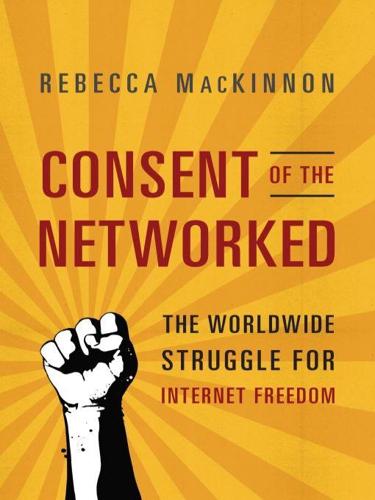
Consent of the Networked: The Worldwide Struggle for Internet Freedom
by
Rebecca MacKinnon
Published 31 Jan 2012
This includes the obvious suspects, such as China, Iran, Vietnam, Saudi Arabia, and Tunisia. But the censorship club’s fastest-growing membership segment consists of democracies, including the United Kingdom, France, the Netherlands, Australia, South Korea, India, and Turkey. Ronald Deibert, director of the Citizen Lab at the University of Toronto, which coordinates much of the Open Net Initiative’s censorship research, wrote in the 2008 book Access Denied, “In less than a decade, the Internet in Europe has evolved from a virtually unfettered environment to one in which filtering in most countries, particularly within the European Union, is the norm rather than the exception.”
…
Buzz Cade, Marilyn Cafferty, Jack Calvert Calyx Internet Access Cameron, David Castells, Manuel Cellan-Jones, Rory Censorship of categories of Internet traffic of data and text messages freedom vs. security Google and national-level filtering systems opposition to national censorship by private intermediaries Center for Democracy and Technology Center for Information Technology Policy, Princeton Center for Internet and Society Chandler, Mark Chaos Computer Club Charter of Human Rights and Principles for the Internet Chesterman, Simon Chile, net neutrality law in China, Internet in censorship controls on political information e-commerce market “e-parliament” Google government-friendly communities “great firewall of China” paradox of patriotic hackers role of government social networking sites China Digital Times, on censorship of Google pullout China Netcom China Unicom Chinese Communist Party control of dissent by economic leadership of use of Internet by Christopher, Warren Cisco Systems, sales of surveillance systems to authoritarian governments Citizen-centric society, threats to Citizen Lab, University of Toronto Citron, Danielle “Civil Rights in an Information Age” (Citron) Cleek, Ashley Clinton, Hillary The Cluetrain Manifesto (Searls) Code and Other Laws of Cyberspace (Lessig) Cognitive Surplus (Shirky) Cohen, Jared Comcast Committee to Protect Journalists Commotion Wireless Communication Power (Castells) “Communique on Principles for Internet Policymaking” (OECD) Contemporary Business News Copyright enforcement Anti-Counterfeiting Trade Agreement (ACTA) concerns about abuse of effects of lobbying on free expression and HADOPI as rationale for surveillance and censorship website shutdowns Council of Europe Crabgrass “Creating Passionate Users” (Sierra blog) Creative Commons Cryptome Cyber-separatism Cybersecurity and Internet Freedom Act of 2011 Dailymotion Daum Deep packet inspection (DPI) Deibert, Ronald Democracy Forum Democracy in America (de Tocqueville) Democracy movements, origin of Democratizing Innovation (von Hippel) Deng Xiaoping Deng Yujiao Denial of service attacks (DDoS) Denton, Nick Department of Homeland Security (DHS) Desai, Nitin Diaspora Diebold Election Systems Digital bonapartism defined in Russia Digital commons activism and licensing need for protection of individual rights role of technical protocols of Digital Due Process (DDP) bill Digital Economy Act (2010) Digital Justice Coalition Digital Millennium Copyright Act (DMCA) Digital real estate Discipline & Punish (Foucault) Doctorow, Cory Doherty, Will Domain name system (DNS) Domini DPI (deep packet inspection) Drumbeat Drummond, David Drupal Dui Hua Foundation Dynamic Coalition on Internet Rights and Principles Dynaweb e-G8 conference ECPA (Electronics Communications Privacy Act of 1986) Egypt activism in government control of mobile phones in surveillance in use of Tor in Egyptian Blogs Aggregator 18th Brumaire of Louis Napoleon (Marx) El-Fattah, Alaa Abd El-Hamalawy, Hossam Electronic Frontier Foundation (EFF) Electronic Industry Code of Conduct Electronics Communications Privacy Act of 1986 (ECPA) Ericsson Estrada, Joseph European Digital Rights Initiative (EDRI) European Service Providers Association EveryDNS Exodus International Extractive Industries Transparency Initiative ExxonMobil Facebook activism and addition of new encryption and security settings attitude toward anonymity digital commons and effectiveness for activists in Egypt inconsistency of policy enforcement lobby to update ECPA politicians and privacy issues protection from hate and harassment “Quit Facebook Day,” real-name policy The Facebook Effect (Kirkpatrick) Facebook Zero Fair Labor Association (FLA) Falun Gong FBI (Federal Bureau of Investigation) F&C Asset Management FCC (Federal Communications Commission) Federal Trade Commission Federalist No. 10 Feriani, Samir The File (Ash) The Filter Bubble (Pariser) Financial Times, on anonymity FinFisher Fiore, Mark Firefox Flickr, removal of photos of Egyptian state security agents from Folksam Ford Motor Company Foreign Affairs on Google’s vision of networked world on US obsession with circumvention Foreign Intelligence Surveillance Act (FISA) Amendments Act (2008) Foucault, Michel Franken, Al Free Press Freedom House Freedom of Connection—Freedom of Expression: The Changing Legal and Regulatory Ecology Shaping the Internet (UNESCO) FreedomBox Freegate Frydman, Gilles “Fugitivus,” The Future of Power (Nye) Gaddafi, Muammar Gamma International UK Ltd.
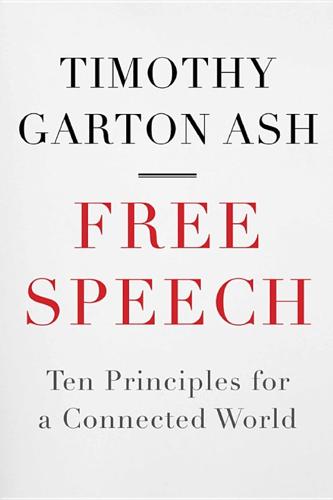
Free Speech: Ten Principles for a Connected World
by
Timothy Garton Ash
Published 23 May 2016
To cries of indignation from securocrats, Apple announced in 2014 that its latest iPhone would have a high level of encryption fitted as standard. So encryption is used against encryption, secrecy against secrecy. Beyond individual self-defence, internet specialists working at leading research centres such as the Citizen Lab in Toronto, the Berkman Centre at Harvard and the Oxford Internet Institute have sometimes been able to turn the tables on states’ secret watchers. Using sophisticated techniques, they can identify where and how state surveillance (and censorship) is taking place.58 Since surveillance literally means watching from above, this has been called sousveillance, or watching from below.
…
The Great Firewall of China (formally the Golden Shield) uses equipment supplied by the American information giant Cisco. A leaked internal Cisco presentation from 2002 noted the Chinese authorities’ wish to use their ‘golden shield’ to ‘combat Falun Gong evil religion and other hostiles’.41 An investigation by the Citizen Lab in Toronto traced the worldwide export by just one California-based provider, Blue Coat Systems, of sophisticated technologies that can be used for filtering, censorship and surveillance. This generated a map of ‘Planet Blue Coat’, showing all the countries where Blue Coat products were almost certainly being used for such purposes.
…
United Nations Human Rights Council, ‘Report of the Special Rapporteur on the Promotion and Protection of the Right to Freedom of Opinion and Expression, Frank La Rue’, 16 May 2011, http://perma.cc/U4A6-8L5Y 37. see Deibert et al., eds. 2010, 283–84 38. see Claire Phipps, ‘Lee Rigby Report: Facebook Accused of Failing to Flag Extremist Messages—as It Happened’, The Guardian, 26 November 2014, http://perma.cc/6TLW-WBNZ, and ‘Woolwich Murder: Facebook Criticism “Unfair”, Former MI6 Director Says’, BBC News, 26 November 2014, http://perma.cc/93KV-6K3Z, identifying Facebook as the site of the ‘online exchange’ 39. see also Virtual Centre of Excellence for Research in Violent Online Political Extremism, http://voxpol.eu 40. see Ian Brown and Douwe Korff, ‘Digital Freedoms in International Law’, 2012, https://perma.cc/8ZQJ-SA57, chapter 3 (including references and links in its footnotes) 41. ‘Overview of the Public Sector’, Wired, 2002, http://perma.cc/9SZG-W6S4 42. Citizen Lab, ‘Planet Blue Coat: Mapping Global Censorship and Surveillance Tools’, 15 January 2013, http://perma.cc/K882-HE28 43. letter to the author from Lauri Kivinen, Head of Corporate Affairs, Nokia Siemens Networks, 25 September 2009 44. see Moez Chakchouk, ‘Tunisian Internet Agency Defends Net Neutrality’, Free Speech Debate, http://freespeechdebate.com/en/media/tunisian-internet-agency-defends-net-neutrality/ 45. see Max Gallien, ‘Imported Repression in the Middle East’, Free Speech Debate, http://freespeechdebate.com/en/discuss/imported-repression-in-the-middle-east/.
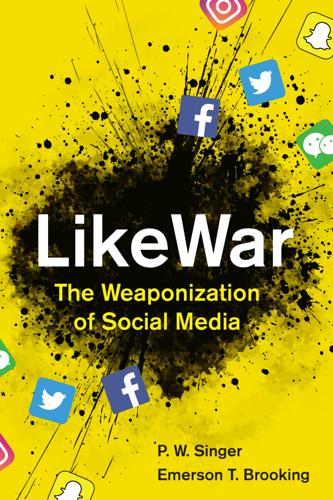
Likewar: The Weaponization of Social Media
by
Peter Warren Singer
and
Emerson T. Brooking
Published 15 Mar 2018
_r=0. 92 clicked the “retweet” button: Dion Nissenbaum, “Detained in Turkey: A Journal Reporter’s Story,” Wall Street Journal, January 6, 2017, https://www.wsj.com/articles/detained-in-turkey-a-journal-reporters-story-1483721224. 92 As Nissenbaum explained: Ibid. 93 he had just become: Nissenbaum email. 93 “cost of the retweet”: Ibid. 93 polices its “clean” internet: Faife, “Iran’s ‘National Internet.’” 93 In Saudi Arabia: Ben Elgin and Peter Robison, “How Despots Use Twitter to Hunt Dissidents,” Bloomberg, October 27, 2016, https://www.bloomberg.com/news/articles/2016-10-27/twitter-s-firehose-of-tweets-is-incredibly-valuable-and-just-as-dangerous. 93 Pakistan became the first: Yasmeen Sherhan, “A Death Penalty for Alleged Blasphemy on Social Media,” The Atlantic, June 12, 2017, https://www.theatlantic.com/news/archive/2017/06/pakistan-facebook-death-penalty/529968/. 94 a crop top: Jay Akbar, “Thailand to Prosecute Anyone That Even LOOKS at Material Considered Insulting to the Monarchy in Extension to Strict Internet Censorship After King Was Pictured in Crop Top,” Daily Mail, May 22, 2017, http://www.dailymail.co.uk/news/article-4529788/Thailand-prosecute-internet-insult-monarchy-king-crop-top.html. 94 “We’ll send you”: Adam Seft et al., “Information Controls During Thailand’s 2014 Coup,” The Citizen Lab, July 9, 2014, https://citizenlab.ca/2014/07/information-controls-thailand-2014-coup/. 94 “Cyber Scouts” program: David Gilbert, “Thailand’s Government Is Using Child ‘Cyber Scouts’ to Monitor Dissent,” Vice, September 19, 2016, https://news.vice.com/article/thailands-royal-family-is-using-child-cyber-scouts-to-monitor-dissent. 94 A Kazakh visiting: Catherine Putz, “Kazakh Man Given 3 Years for Insulting Putin,” The Diplomat, December 28, 2016, https://thediplomat.com/2016/12/kazakh-man-given-3-years-for-insulting-putin/. 94 “discrediting the political order”: Tetyana Lokot, “Hard Labor for Woman Who Reposted Online Criticism of Russia’s Actions in Ukraine,” Global Voices, February 22, 2016, https://globalvoices.org/2016/02/22/hard-labor-for-woman-who-reposted-online-criticism-of-russias-actions-in-ukraine/. 94 Durov sold his shares: Amar Toor, “How Putin’s Cronies Seized Control of Russia’s Facebook,” The Verge, January 31, 2014, https://www.theverge.com/2014/1/31/5363990/how-putins-cronies-seized-control-over-russias-facebook-pavel-durov-vk. 95 “spiral of silence”: Elizabeth Stoycheff, “Under Surveillance: Examining Facebook’s Spiral of Silence Effects in the Wake of NSA Internet Monitoring,” Journalism and Mass Communication Quarterly 93, no. 2 (2016): 296–311. 95 actual majority opinion: Ibid. 95 first email ever sent: Jeremy Goldhorn, “The Internet,” in The China Story, Australian Centre on China in the World, August 2, 2012, https://www.thechinastory.org/keyword/the-internet/. 95 China passed the United States: David Barboza, “China Surpasses U.S. in Number of Internet Users,” New York Times, July 26, 2008, http://www.nytimes.com/2008/07/26/business/worldbusiness/26internet.html. 95 nearly 800 million: Steven Millward, “China Now Has 731 Million Internet Users, 95% Access from Their Phones,” Tech in Asia, January 22, 2017, https://www.techinasia.com/china-731-million-internet-users-end-2016. 96 “harmonious society”: Maureen Fan, “China’s Party Leadership Declares New Priority: ‘Harmonious Society,’” Washington Post, October 12, 2006, http://www.washingtonpost.com/wp-dyn/content/article/2006/10/11/AR2006101101610.html. 96 “correct guidance”: David Bandurski, “Chinese Leaders Meditate Loudly on the Philosophy of Censorship as 17th Congress Nears,” China Media Project, August 30, 2007, http://cmp.hku.hk/2007/08/30/as-the-17th-national-congress-nears-party-meditations-on-the-philosophy-of-censorship/. 96 hand in hand with: Jack Linchuan Qiu, “Virtual Censorship in China: Keeping the Gate Between the Cyberspaces,” International Journal of Communications Law and Policy, no. 4 (Winter 1999/2000): 11. 96 Golden Shield Project: Zixue Tai, “Casting the Ubiquitous Net of Information Control: Internet Surveillance in China from Golden Shield to Green Dam,” International Journal of Advanced Pervasive and Ubiquitous Computing 2, no. 1 (2010): 239. 97 Sun Microsystems and Cisco: Qiu, “Virtual Censorship in China.” 97 fail to reach: Lotus Ruan, Jeffrey Knockel, and Masashi Crete-Nishihata, “We (Can’t) Chat: ‘709 Crackdown’ Discussions Blocked on Weibo and WeChat,” The Citizen Lab, April 13, 2017, https://citizenlab.ca/2017/04/we-cant-chat-709-crackdown-discussions-blocked-on-weibo-and-wechat/. 97 so-called Panama Papers: Tom Phillips, “All Mentions of Panama Papers Banned from Chinese Websites,” The Guardian, April 5, 2016, https://www.theguardian.com/news/2016/apr/05/all-mention-of-panama-papers-banned-from-chinese-websites. 97 “Delete Report” was dispatched: Samuel Wade, “Minitrue: Panama Papers and Foreign Media Attacks,” China Digital Times, April 4, 2016, https://chinadigitaltimes.net/2016/04/minitrue-panama-papers-foreign-media-attacks/. 97 nation of Panama: Phillips, “All Mentions of Panama Papers Banned.” 98 “river crab’d”: “Harmonization,” Know Your Meme, accessed March 19, 2018, http://knowyourmeme.com/memes/harmonization-%E6%B2%B3%E8%9F%B9. 98 Winnie-the-Pooh was disappeared: Yuan Yang, “Winnie the Pooh Blacklisted by China’s Online Censors,” Financial Times, July 16, 2017, https://amp.ft.com/content/cf7fd22e-69d5-11e7-bfeb-33fe0c5b7eaa. 98 “cleanse the web”: David Wertime, “Chinese Websites Deleted One Billion Posts in 2014, State Media Says,” Tea Leaf Nation (blog), Foreign Policy, January 17, 2015, http://foreignpolicy.com/2015/01/17/chinese-websites-deleted-one-billion-posts-in-2014-state-media-says/. 98 elimination of nearly 300: Nikhil Sonnad, “261 Ways to Refer to the Tiananmen Square Massacre in China,” Quartz, June 3, 2016, https://qz.com/698990/261-ways-to-refer-to-the-tiananmen-square-massacre-in-china/. 98 Baidu Baike: Malcolm Moore, “Tiananmen Massacre 25th Anniversary: The Silencing Campaign,” The Telegraph, May 18, 2014, http://www.telegraph.co.uk/news/worldnews/asia/china/10837992/Tiananmen-Massacre-25th-anniversary-the-silencing-campaign.html. 98 “disturbing public order”: Oiwan Lam, “Chinese Police Arrested a Man for Complaining About Hospital Food.
…
_r=0. 92 clicked the “retweet” button: Dion Nissenbaum, “Detained in Turkey: A Journal Reporter’s Story,” Wall Street Journal, January 6, 2017, https://www.wsj.com/articles/detained-in-turkey-a-journal-reporters-story-1483721224. 92 As Nissenbaum explained: Ibid. 93 he had just become: Nissenbaum email. 93 “cost of the retweet”: Ibid. 93 polices its “clean” internet: Faife, “Iran’s ‘National Internet.’” 93 In Saudi Arabia: Ben Elgin and Peter Robison, “How Despots Use Twitter to Hunt Dissidents,” Bloomberg, October 27, 2016, https://www.bloomberg.com/news/articles/2016-10-27/twitter-s-firehose-of-tweets-is-incredibly-valuable-and-just-as-dangerous. 93 Pakistan became the first: Yasmeen Sherhan, “A Death Penalty for Alleged Blasphemy on Social Media,” The Atlantic, June 12, 2017, https://www.theatlantic.com/news/archive/2017/06/pakistan-facebook-death-penalty/529968/. 94 a crop top: Jay Akbar, “Thailand to Prosecute Anyone That Even LOOKS at Material Considered Insulting to the Monarchy in Extension to Strict Internet Censorship After King Was Pictured in Crop Top,” Daily Mail, May 22, 2017, http://www.dailymail.co.uk/news/article-4529788/Thailand-prosecute-internet-insult-monarchy-king-crop-top.html. 94 “We’ll send you”: Adam Seft et al., “Information Controls During Thailand’s 2014 Coup,” The Citizen Lab, July 9, 2014, https://citizenlab.ca/2014/07/information-controls-thailand-2014-coup/. 94 “Cyber Scouts” program: David Gilbert, “Thailand’s Government Is Using Child ‘Cyber Scouts’ to Monitor Dissent,” Vice, September 19, 2016, https://news.vice.com/article/thailands-royal-family-is-using-child-cyber-scouts-to-monitor-dissent. 94 A Kazakh visiting: Catherine Putz, “Kazakh Man Given 3 Years for Insulting Putin,” The Diplomat, December 28, 2016, https://thediplomat.com/2016/12/kazakh-man-given-3-years-for-insulting-putin/. 94 “discrediting the political order”: Tetyana Lokot, “Hard Labor for Woman Who Reposted Online Criticism of Russia’s Actions in Ukraine,” Global Voices, February 22, 2016, https://globalvoices.org/2016/02/22/hard-labor-for-woman-who-reposted-online-criticism-of-russias-actions-in-ukraine/. 94 Durov sold his shares: Amar Toor, “How Putin’s Cronies Seized Control of Russia’s Facebook,” The Verge, January 31, 2014, https://www.theverge.com/2014/1/31/5363990/how-putins-cronies-seized-control-over-russias-facebook-pavel-durov-vk. 95 “spiral of silence”: Elizabeth Stoycheff, “Under Surveillance: Examining Facebook’s Spiral of Silence Effects in the Wake of NSA Internet Monitoring,” Journalism and Mass Communication Quarterly 93, no. 2 (2016): 296–311. 95 actual majority opinion: Ibid. 95 first email ever sent: Jeremy Goldhorn, “The Internet,” in The China Story, Australian Centre on China in the World, August 2, 2012, https://www.thechinastory.org/keyword/the-internet/. 95 China passed the United States: David Barboza, “China Surpasses U.S. in Number of Internet Users,” New York Times, July 26, 2008, http://www.nytimes.com/2008/07/26/business/worldbusiness/26internet.html. 95 nearly 800 million: Steven Millward, “China Now Has 731 Million Internet Users, 95% Access from Their Phones,” Tech in Asia, January 22, 2017, https://www.techinasia.com/china-731-million-internet-users-end-2016. 96 “harmonious society”: Maureen Fan, “China’s Party Leadership Declares New Priority: ‘Harmonious Society,’” Washington Post, October 12, 2006, http://www.washingtonpost.com/wp-dyn/content/article/2006/10/11/AR2006101101610.html. 96 “correct guidance”: David Bandurski, “Chinese Leaders Meditate Loudly on the Philosophy of Censorship as 17th Congress Nears,” China Media Project, August 30, 2007, http://cmp.hku.hk/2007/08/30/as-the-17th-national-congress-nears-party-meditations-on-the-philosophy-of-censorship/. 96 hand in hand with: Jack Linchuan Qiu, “Virtual Censorship in China: Keeping the Gate Between the Cyberspaces,” International Journal of Communications Law and Policy, no. 4 (Winter 1999/2000): 11. 96 Golden Shield Project: Zixue Tai, “Casting the Ubiquitous Net of Information Control: Internet Surveillance in China from Golden Shield to Green Dam,” International Journal of Advanced Pervasive and Ubiquitous Computing 2, no. 1 (2010): 239. 97 Sun Microsystems and Cisco: Qiu, “Virtual Censorship in China.” 97 fail to reach: Lotus Ruan, Jeffrey Knockel, and Masashi Crete-Nishihata, “We (Can’t) Chat: ‘709 Crackdown’ Discussions Blocked on Weibo and WeChat,” The Citizen Lab, April 13, 2017, https://citizenlab.ca/2017/04/we-cant-chat-709-crackdown-discussions-blocked-on-weibo-and-wechat/. 97 so-called Panama Papers: Tom Phillips, “All Mentions of Panama Papers Banned from Chinese Websites,” The Guardian, April 5, 2016, https://www.theguardian.com/news/2016/apr/05/all-mention-of-panama-papers-banned-from-chinese-websites. 97 “Delete Report” was dispatched: Samuel Wade, “Minitrue: Panama Papers and Foreign Media Attacks,” China Digital Times, April 4, 2016, https://chinadigitaltimes.net/2016/04/minitrue-panama-papers-foreign-media-attacks/. 97 nation of Panama: Phillips, “All Mentions of Panama Papers Banned.” 98 “river crab’d”: “Harmonization,” Know Your Meme, accessed March 19, 2018, http://knowyourmeme.com/memes/harmonization-%E6%B2%B3%E8%9F%B9. 98 Winnie-the-Pooh was disappeared: Yuan Yang, “Winnie the Pooh Blacklisted by China’s Online Censors,” Financial Times, July 16, 2017, https://amp.ft.com/content/cf7fd22e-69d5-11e7-bfeb-33fe0c5b7eaa. 98 “cleanse the web”: David Wertime, “Chinese Websites Deleted One Billion Posts in 2014, State Media Says,” Tea Leaf Nation (blog), Foreign Policy, January 17, 2015, http://foreignpolicy.com/2015/01/17/chinese-websites-deleted-one-billion-posts-in-2014-state-media-says/. 98 elimination of nearly 300: Nikhil Sonnad, “261 Ways to Refer to the Tiananmen Square Massacre in China,” Quartz, June 3, 2016, https://qz.com/698990/261-ways-to-refer-to-the-tiananmen-square-massacre-in-china/. 98 Baidu Baike: Malcolm Moore, “Tiananmen Massacre 25th Anniversary: The Silencing Campaign,” The Telegraph, May 18, 2014, http://www.telegraph.co.uk/news/worldnews/asia/china/10837992/Tiananmen-Massacre-25th-anniversary-the-silencing-campaign.html. 98 “disturbing public order”: Oiwan Lam, “Chinese Police Arrested a Man for Complaining About Hospital Food.
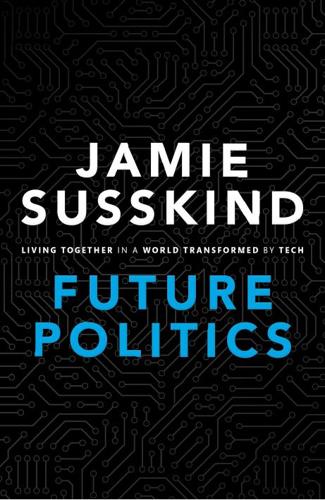
Future Politics: Living Together in a World Transformed by Tech
by
Jamie Susskind
Published 3 Sep 2018
See Jonathan Zittrain, ‘Apple’s Emoji Gun Control’, New York Times, 16 August 2016 <https://mobile.nytimes.com/2016/08/16/opinion/ get-out-of-gun-control-apple.html?_r=0&referer=https://www. google.com/> (accessed 1 December 2017). Lotus Ruan, Jeffrey Knockel, Jason Q. Ng, and Masashi CreteNishihata, ‘One App, Two Systems’, The Citizen Lab, 30 November 2016 <https://citizenlab.ca/2016/11/wechat-china-censorship-oneapp-two-systems/> (accessed 1 December 2017). Zittrain, ‘Apple’s Emoji Gun Control’. Robert Booth, ‘Facebook Reveals News Feed Experiment to Control Emotions’, The Guardian, 30 June 2004 <https://www.theguardian. com/technology/2014/jun/29/facebook-users-emotions-newsfeeds> (accessed 11 December 2017).
…
Translated by Donald A. Cress. Indianapolis: Hackett Publishing Company, 1992. OUP CORRECTED PROOF – FINAL, 28/05/18, SPi РЕЛИЗ ПОДГОТОВИЛА ГРУППА "What's News" VK.COM/WSNWS Bibliography 477 Ruan, Lotus, Jeffrey Knockel, Jason Q. Ng, and Masashi Crete-Nishihata. ‘One App, Two Systems’. The Citizen Lab, 30 Nov. 2016 <https:// citizenlab.ca/2016/11/wechat-china-censorship-one-app-two-systems/> (accessed 1 Dec. 2017). Runciman, David. Politics. London: Profile Books, 2014. Ruparelia, Nayan B. Cloud Computing. Cambridge, Mass: MIT Press, 2016. Rushkoff, Douglas. Program or be Programmed:Ten Commands for a Digital Age.
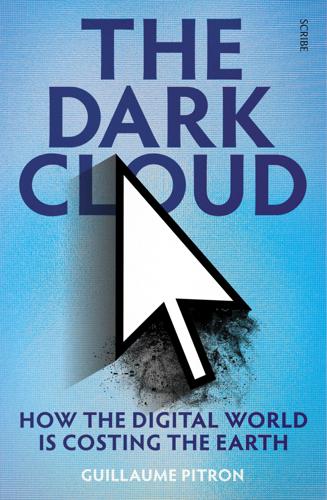
The Dark Cloud: How the Digital World Is Costing the Earth
by
Guillaume Pitron
Published 14 Jun 2023
This economy exists thanks to advertising, starting with American radio stations in the 1920s, then television, then the internet (the first ad banner appeared in 1994), much to the ire of the pioneers of the Web who conceived the internet as a space rid of the rationale of profit. Today ‘the Web represents the extension of the media business model to industries of all.’ 39 Julien Le Bot, Dans la tête de Marc Zuckerberg [‘In the head of Mark Zuckerberg’], Actes Sud, 2019. 40 Interview with Douwe Schmidt, Smart Citizens Lab, Waag Society, 2020. 41 Watch the forty-eight-minute documentary by Sandy Smolan, The Human Face of Big Data, Against All Odds Production, 2014. The holy grail is the advent of strong artificial intelligence — a prospect many experts are dubious about, which I address in chapter 8. In his book, the Taiwanese writer Kai-Fu Lee maintains that China will be the master of artificial intelligence, not because its engineers and algorithms will be better than their American counterparts, but because their machines will be rendered more intelligent from the sheer volume of data collected by the Chinese digital giants, the BATX (Baidu, Alibaba, Tencent and Xiaomi).
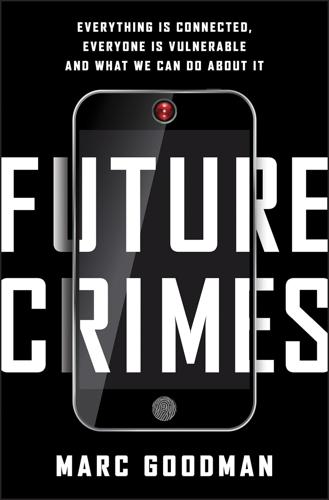
Future Crimes: Everything Is Connected, Everyone Is Vulnerable and What We Can Do About It
by
Marc Goodman
Published 24 Feb 2015
Of course it is not just the American military’s technology that is being targeted by China, but rather a litany of Washington institutions, including law firms, think tanks, human rights groups, contractors, congressional offices, embassies, and any number of federal agencies. Moreover, a 2009 report by Canadian researchers at the Infowar Monitor, the SecDev Group, and the Citizen Lab at the University of Toronto uncovered the so-called GhostNet, “a vast global cyber espionage network” extending to 103 countries that was controlled by servers in China and targeted the Tibetan government in exile and the Dalai Lama himself. China has also been accused of hacking numerous media outlets, including most famously the New York Times in early 2013 after the paper reported that the relatives of China’s prime minister, Wen Jiabao, had accumulated billions of dollars of wealth through their business dealings since Wen had entered office.
…
Millman, “Cybercriminals Work in a Sophisticated Market Structure,” Wall Street Journal, June 27, 2013. 79 Worse, it was the tool of choice: Dana Liebelson, “All About Blackshades, the Malware That Lets Hackers Watch You Through Your Webcam,” Mother Jones, May 21, 2014. 80 So good was the Blackshades RAT: “Syrian Activists Targeted with BlackShades Spy Software,” The Citizen Lab, June 19, 2012. 81 The rewards, however: Gregg Keizer, “Google to Pay Bounties for Chrome Browser Bugs,” Computerworld, Jan. 29, 2010. 82 Not to be outdone: Brian Krebs, “Meet Paunch: The Accused Author of the BlackHole Exploit Kit,” Krebs on Security, Dec. 6, 2013. 83 Dark Net chat rooms: Nicole Perlroth and David E.
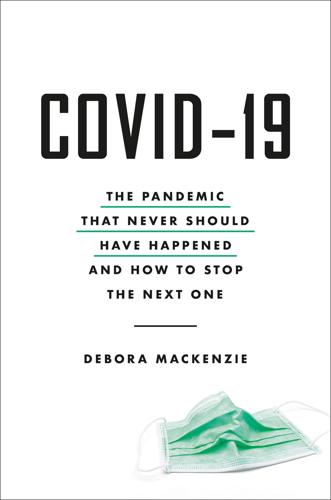
Covid-19: The Pandemic That Never Should Have Happened and How to Stop the Next One
by
Debora MacKenzie
Published 13 Jul 2020
The Japanese… rumors: Keisuke Kawazu, “Public backlash over China gov’t accusations against docs who sounded coronavirus alarm,” The Mainchi, January 31, 2020, mainichi.jp/english/articles/20200131/p2a/00m/0in/021000c. 32. And, that day… YY: Lotus Ruan, Jeffrey Knockel, and Masashi Crete-Nishihata, “Censored contagion: how information on the coronavirus is managed on Chinese social media,” The Citizen Lab (University of Toronto), March 3, 2020, citizenlab.ca/2020/03/censored-contagion-how-information-on-the-coronavirus-is-managed-on-chinese-social-media. 33. If I had… the whistle: Lily Kuo, “Coronavirus: Wuhan doctor speaks out against authorities,” Guardian, March 11, 2020, www.theguardian.com/world/2020/mar/11/coronavirus-wuhan-doctor-ai-fen-speaks-out-against-authorities. 34.
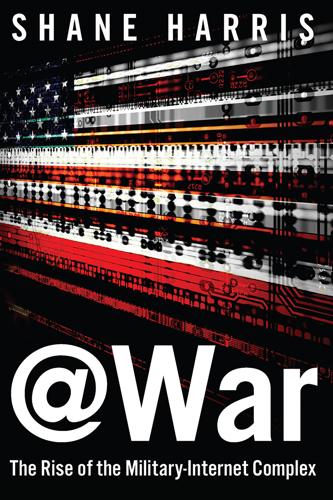
@War: The Rise of the Military-Internet Complex
by
Shane Harris
Published 14 Sep 2014
Hacking Team claims that it sells only to governmental law enforcement and intelligence agencies, and that it will not sell to “countries blacklisted” by the United States, the European Union and NATO, or members of the ASEAN group of Southeast Asian countries. It also promises to review all potential customers to ensure that the technology won’t “be used to facilitate human rights violations.” But in October 2012, researchers with Citizen Lab at the University of Toronto reported that Hacking Team’s Remote Control System was used to infect the computer of a prominent pro-democracy activist in the United Arab Emirates named Ahmed Mansoor, a forty-four-year-old electrical engineer who had once been imprisoned for signing an online petition calling for open elections in a country ruled by hereditary monarchs.
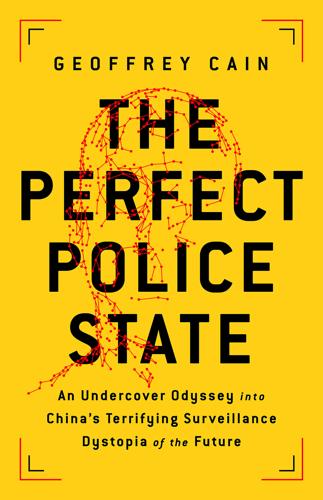
The Perfect Police State: An Undercover Odyssey Into China's Terrifying Surveillance Dystopia of the Future
by
Geoffrey Cain
Published 28 Jun 2021
,” Diplomat, August 11, 2018, https://thediplomat.com/2018/08/did-the-obama-xi-cyber-agreement-work/. 18. Since 2016, numerous studies have revealed broad consistencies with Irfan’s and other Uyghur technology workers’ testimonies gathered by the author. See Jeffrey Knockel, et al., “We Chat, They Watch: How International Users Unwittingly Build Up WeChat’s Censorship Apparatus,” Citizen Lab, University of Toronto, May 7, 2020. https://citizenlab.ca/2020/05/we-chat-they-watch/. In an Amnesty International 2016 survey of the world’s most popular apps, WeChat got a score of zero out of one hundred for privacy, and ranked its owner, Tencent, last behind Facebook, Google, and Apple. Amnesty believed WeChat users had little or no encryption for their communications.
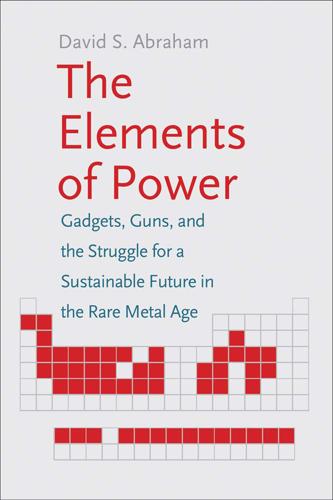
The Elements of Power: Gadgets, Guns, and the Struggle for a Sustainable Future in the Rare Metal Age
by
David S. Abraham
Published 27 Oct 2015
Zakir Hussain, “4 Too Many: Indonesian Spiritual Guru Splits Up with Half His 8 Wives,” Straits Times, May 29, 2013, www.stasiareport.com/the-big-story/asia-report/indonesia/story/4-too-many-indonesian-spiritual-guru-splits-half-his-8-wives; Emma Watson, Twitter post, May 29, 2013, https://twitter.com/EmmaWatsonIndo/status/339996137161383936/photo/1. 28. Indonesia Investments, “Internet Penetration in Indonesia”; Mariel Grazella, “Mobile Data Use Skyrocketing,” Jakarta Post, January 22, 2014, www.thejakartapost.com/news/2014/01/22/mobile-data-use-skyrocketing.html; Citizen Lab, “IGF 2013: An Overview of Indonesian Internet Infrastructure and Governance,” University of Toronto, October 25, 2013, citizenlab.org/2013/10/igf-2013-an-overview-of-indonesian-internet-infrastructure-and-governance/; statistic as of 2012; Metal-Pages, “Booming Sales of Wearable Electronics Creating Markets for Minor Metals and Rare Earths,” April 11, 2014, www.metal-pages.com/news/story/78823/booming-sales-of-wearable-electronics-creating-markets-for-minor-metals-and-rare-earths/; International Data Corporation estimates. 29.
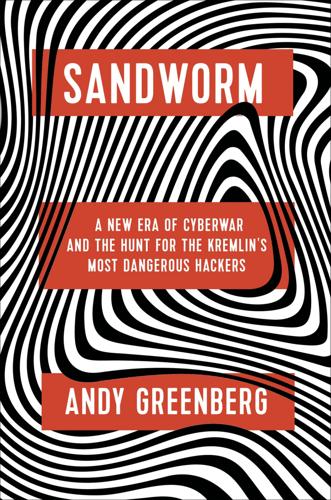
Sandworm: A New Era of Cyberwar and the Hunt for the Kremlin's Most Dangerous Hackers
by
Andy Greenberg
Published 5 Nov 2019
And now, in the service of Vladimir Putin, they were tasked with helping Donald Trump to win the presidency. The 2016 presidential race wasn’t Fancy Bear’s first time using its skills to influence elections. In May 2017, a group of security researchers at the University of Toronto called the Citizen Lab would find forensic evidence that the group was also behind CyberBerkut, the pro-Putin hacktivist group that had in 2014 hacked Ukraine’s Central Election Commission. Like Guccifer 2.0 and DCLeaks, CyberBerkut was just another cover story. Most of the group’s techniques were simple. Next to an operation like Sandworm’s 2015 Christmas blackout, they were practically primitive.

Exponential: How Accelerating Technology Is Leaving Us Behind and What to Do About It
by
Azeem Azhar
Published 6 Sep 2021
Cunningham, ‘Preparing the Cyber Battlefield: Assessing a Novel Escalation Risk in a Sino-American Crisis’, Texas National Security Review, October 2020 <http://tnsr.org/2020/10/preparing-the-cyber-battlefield-assessing-a-novel-escalation-risk-in-a-sino-american-crisis/> [accessed 23 April 2021]. 71 Jens Stoltenberg, ‘Nato Will Defend Itself’, Prospect Magazine, 27 August 2019 <https://www.prospectmagazine.co.uk/world/nato-will-defend-itself-summit-jens-stoltenberg-cyber-security> [accessed 12 March 2020].” 72 ‘CyberPeace Institute Calls for Accountability of Intrusion as a Service’, CyperPeace Institute, 10 January 2021 <https://cyberpeaceinstitute.org/news/cyberpeace-institute-calls-for-accountability-of-intrusion-as-a-service>. 73 ‘Western Firms Should Not Sell Spyware to Tyrants’, The Economist, 12 December 2019 <https://www.economist.com/leaders/2019/12/12/western-firms-should-not-sell-spyware-to-tyrants> [accessed 26 April 2021]. 74 Bill Marczak et al., ‘The Great IPwn: Journalists Hacked with Suspected NSO Group IMessage “Zero-Click” Exploit’, The Citizen Lab, 20 December 2020 <https://citizenlab.ca/2020/12/the-great-ipwn-journalists-hacked-with-suspected-nso-group-imessage-zero-click-exploit/> [accessed 26 April 2021]. 75 Vincen Boulanin, Limits on Autonomy in Weapons Systems (SIPRI, 2020) <https://www.sipri.org/sites/default/files/2020-06/2006_limits_of_autonomy.pdf>.

The One Device: The Secret History of the iPhone
by
Brian Merchant
Published 19 Jun 2017
In 2015, the security firm Zerodium paid a bounty of one million dollars for a chain of zero-day exploits (vulnerabilities that the vendor isn’t aware of) on the iPhone, though no one knows who won the money. And no one, save Zerodium, knows what became of the zero days. And in 2016, Toronto’s Citizen Lab revealed that a very sophisticated form of malware, called Trident, had been used to try to infect a civil rights activist’s phone in the UAE. The hack was revealed to have been the work of an Israeli company, which was believed to have sold its spyware for as much as $500,000—likely to authoritarian regimes like the UAE government.
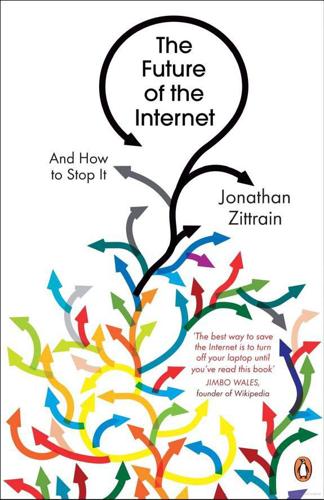
The Future of the Internet: And How to Stop It
by
Jonathan Zittrain
Published 27 May 2009
See JACK GOLDSMITH & TIM WU, WHO CONTROLS THE INTERNET;, 113, 120 (2006) (characterizing most attempts at “sidestepping copyright” as mere phases and noting Steve Jobs’s observation that users “would rather pay for music online than spend hours evading detection”). 26. See, e.g., Nart Villeneuve, Director, Citizen Lab at the Univ. of Toronto, Technical Ways to Get Around Censorship, http://www.rsf.org/article.php3?id_article=15013 (last visited June 1, 2007); Ethan Zuckerman, How to Blog Anonymously, http://www.rsf.org/article.php3?id_article=15012 (last visited June 1, 2007). 27. See BBC NEWS, Country Profile: North Korea, Feb. 14, 2007, http://news.bbc.co.uk/ 2/hi/asia-pacific/country_profiles/1131421.stm; Cathy Hong, Puncturing a Regime with Balloons, THE VILLAGE VOICE, Aug. 13—19, 2003, available at http://wwwvillagevoice.com/news/0333,hong,46013,1.html 28.
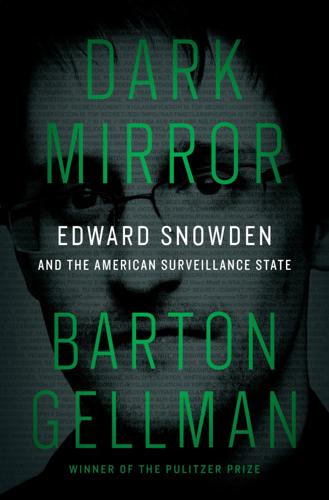
Dark Mirror: Edward Snowden and the Surveillance State
by
Barton Gellman
Published 20 May 2020
I do not, ever, run executable files or scripts that arrive by email, so these were not a big concern. One day, however, a more interesting exploit showed up. The sender tried to make it attractive, disguising the file as a leaked presentation on surveillance. I asked Morgan Marquis-Boire, a security researcher then affiliated with the Toronto-based Citizen Lab, if he would care to have a look. “You’ve got a juicy one,” he wrote back. Most hacking attempts are conducted at scale. The same malicious package is sent to thousands of people at a time, or millions, as email attachments or links to infected websites. This one was customized for me. It was a class of malware known as a remote access trojan, or RAT, capable of monitoring keystrokes, capturing screenshots, recording audio and video, and exfiltrating any file on my computer.
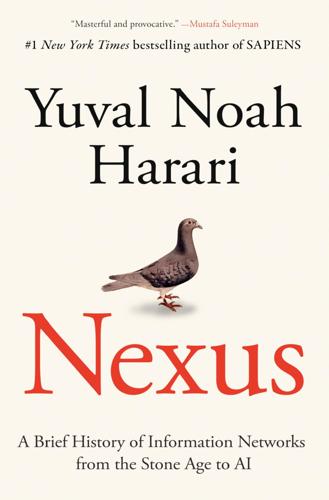
Nexus: A Brief History of Information Networks From the Stone Age to AI
by
Yuval Noah Harari
Published 9 Sep 2024
“Iran: Doubling Down on Punishments Against Women and Girls Defying Discriminatory Veiling Laws,” Amnesty International; Shadi Sadr, “Iran’s Hijab and Chastity Bill Underscores the Need to Codify Gender Apartheid,” Just Security, April 11, 2024, https://www.justsecurity.org/94504/iran-hijab-bill-gender-apartheid/; Tara Subramaniam, Adam Pourahmadi and Mostafa Salem, “Iranian Women Face 10 Years in Jail for Inappropriate Dress after ‘Hijab Bill’ Approved,” CNN, September 21, 2023, https://edition.cnn.com/2023/09/21/middleeast/iran-hijab-law-parliament-jail-intl-hnk/index.html; “Iran’s Parliament Passes a Stricter Headscarf Law Days after Protest Anniversary,”, AP News, September 21, 2023, https://apnews.com/article/iran-hijab-women-politics-protests-6e07fae990369a58cb162eb6c5a7ab2a?utm_source=copy&utm_medium=share. 41. Christopher Parsons et al., “The Predator in Your Pocket: A Multidisciplinary Assessment of the Stalkerware Application Industry,” Citizen Lab, Research report 119, June 2019, citizenlab.ca/docs/stalkerware-holistic.pdf; Lorenzo Franceschi-Bicchierai and Joseph Cox, “Inside the ‘Stalkerware’ Surveillance Market, Where Ordinary People Tap Each Other’s Phones,” Vice, April 18, 2017, www.vice.com/en/article/53vm7n/inside-stalkerware-surveillance-market-flexispy-retina-x. 42.

Four Battlegrounds
by
Paul Scharre
Published 18 Jan 2023
Baumeister et al., “Bad Is Stronger Than Good,” Review of General Psychology 5, no 4 (2001), 323–370, http://assets.csom.umn.edu/assets/71516.pdf 146fake news traveled six times faster: Vosoughi, Roy, and Aral, “The Spread of True and False News Online.” 146news that inspires fear: Tufekci, “YouTube, the Great Radicalizer.” 146disincentivizing “creating provocative content”: Zuckerberg, “A Blueprint for Content Governance.” 146prohibit manipulative behavior and certain categories of content: “Objectionable Content,” Facebook Community Standards, n.d., https://www.facebook.com/communitystandards/objectionable_content; “The Twitter Rules,” Twitter Help Center, n.d., https://help.twitter.com/en/rules-and-policies/twitter-rules; “Community Guidelines,” Youtube, n.d., https://www.youtube.com/howyoutubeworks/policies/community-guidelines/. 146the information seen by more than 4 billion people: Kemp, “Social Media Users Pass the 4 Billion Mark.” 146censored social media platforms: Lotus Ruan et al., “One App, Two Systems,” The Citizen Lab, University of Toronto, November 30, 2016, https://citizenlab.ca/2016/11/wechat-china-censorship-one-app-two-systems/. 146Tencent’s WeChat: Monthly active users as of 30 September 2020. Tencent, “Tencent Announces 2020 Third Quarter Results,” news release, Hong Kong, November 12, 2020, https://static.www.tencent.com/uploads/2020/11/12/4c2090d5f6f00fd90ddc9bbd9a1415d1.pdf. 1462.3 million active users in the United States: Jeanne Whalen, “Chinese Censorship Invades the U.S. via WeChat,” Washington Post, January 7, 2021, https://www.washingtonpost.com/technology/2021/01/07/wechat-censorship-china-us-ban/. 146TikTok: Yingzhi Yang, “Tik Tok Hits 500 Million Global Monthly Active Users as China Social Media Video Craze Continues,” South China Morning Post, July 17, 2018, https://www.scmp.com/tech/article/2155580/tik-tok-hits-500-million-global-monthly-active-users-china-social-media-video; Sarah Perez, “TikTok Surpassed Facebook, Instagram, Snapchat & YouTube in Downloads Last Month,” TechCrunch, November 2, 2018, https://techcrunch.com/2018/11/02/tiktok-surpassed-facebook-instagram-snapchat-youtube-in-downloads-last-month/. 146India, the United States, Indonesia, Russia, Japan, and Europe: Debra Aho Williamson, “TikTok Users Around the World 2020,” eMarketer, December 14, 2020, https://www.emarketer.com/content/tiktok-users-around-world-2020. 146nearly 700 million users globally: Alex Sherman, “TikTok Reveals Detailed User Numbers for the First Time,” CNBC, August 24, 2020, https://www.cnbc.com/2020/08/24/tiktok-reveals-us-global-user-growth-numbers-for-first-time.html. 147Douyin: Yingzhi Yang and Brenda Goh, “ByteDance’s Chinese Version of TikTok Hits 600 Million Daily Users,” Reuters, September 15, 2020, https://www.reuters.com/article/us-china-bytedance/bytedances-chinese-version-of-tiktok-hits-600-million-daily-users-idUSKBN2660P4. 147national security risks of a Chinese-owned social media app: Tom Cotton, Senator for Arkansas, “Cotton, Schumer Request Assessment of National Security Risks Posed by China-Owned Video-Sharing Platform, TikTok, a Potential Counterintelligence Threat with Over 110 Million Downloads in U.S., Alone,” news release, October 24, 2019, https://www.cotton.senate.gov/news/press-releases/cotton-schumer-request-assessment-of-national-security-risks-posed-by-china-owned-video-sharing-platform-tiktok-a-potential-counterintelligence-threat-with-over-110-million-downloads-in-us-alone. 147India banned TikTok: “Government Bans 59 Mobile Apps Which Are Prejudicial to Sovereignty and Integrity of India, Defence of India, Security of State and Public Order,” Ministry of Electronics & IT, Government of India, June 29, 2020, https://pib.gov.in/PressReleseDetailm.aspx?
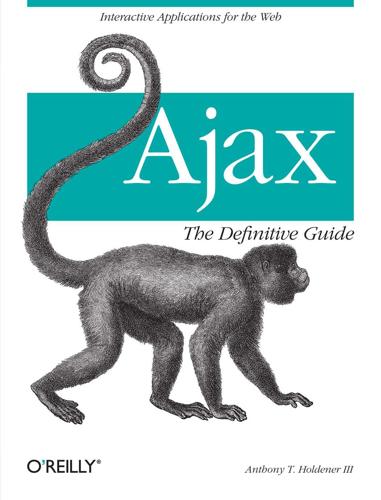
Ajax: The Definitive Guide
by
Anthony T. Holdener
Published 25 Jan 2008
Protocol(s): REST Service account: Yes Developer key: Yes Cost: Free for personal use, $5–$1,000/month for commercial use License: Creative Commons Share Alike license Amnesty International Category: Other Overview: Censored sites and data service 892 Amnesty International (continued) API link: http://irrepressible.info/api Description: Amnesty International is working with the OpenNet Initiative (ONI) to help raise awareness of Internet censorship around the world. The ONI is a collaboration of the Citizen Lab, Munk Centre for International Studies, University of Toronto, Advanced Network Research Group at Cambridge University, Berkman Center for Internet & Society at Harvard Law School UK, and Oxford Internet Institute, plus partner nongovernmental organizations worldwide. Protocol(s): REST Service account: No Developer key: No Cost: Free AOL Instant Messenger Category: Chat Overview: Instant messaging service API link: http://developer.aim.com/ Description: The AIM service allows developers access to AOL’s platform, enabling developers to create custom programs utilizing AOL Instant Messenger functionality.
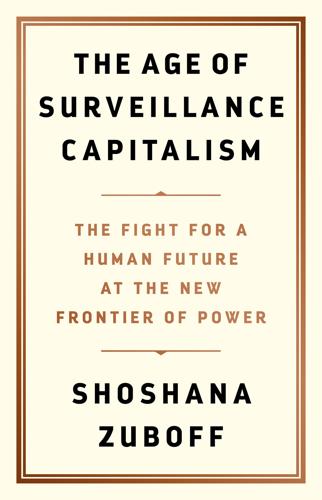
The Age of Surveillance Capitalism
by
Shoshana Zuboff
Published 15 Jan 2019
According to the Center for Media and Democracy’s investigatory research report, “The Googlization of the Far Right,” the corporation’s 2012 list of grantees featured a new group of antigovernment groups known for their opposition to regulation and taxes and their support for climate-change denial, including Grover Norquist’s Americans for Tax Reform, the Koch brothers–funded Heritage Action, and other antiregulatory groups such as the Federalist Society and the Cato Institute.114 The corporation also quietly acknowledged its membership in the corporate lobbying group ALEC, known for its opposition to gun control and emissions curbs, and for its support for voter-suppression schemes, tobacco industry tax breaks, and other far-right causes.115 Meanwhile, a list of Google Policy Fellows for 2014 included individuals from a range of nonprofit organizations whom one would expect to be leading the fight against that corporation’s concentrations of information and power, including the Center for Democracy and Technology, the Electronic Frontier Foundation, the Future of Privacy Forum, the National Consumers League, the Citizen Lab, and the Asociación por los Derechos Civiles.116 In July 2017 the Wall Street Journal reported that since 2009, Google had actively sought out and provided funding to university professors for research and policy papers that support Google’s positions on matters related to law, regulation, competition, patents, and so forth.117 In many cases, Google weighed in on the papers before publication, and some of the authors did not disclose Google as a source of funding.